Chaminade
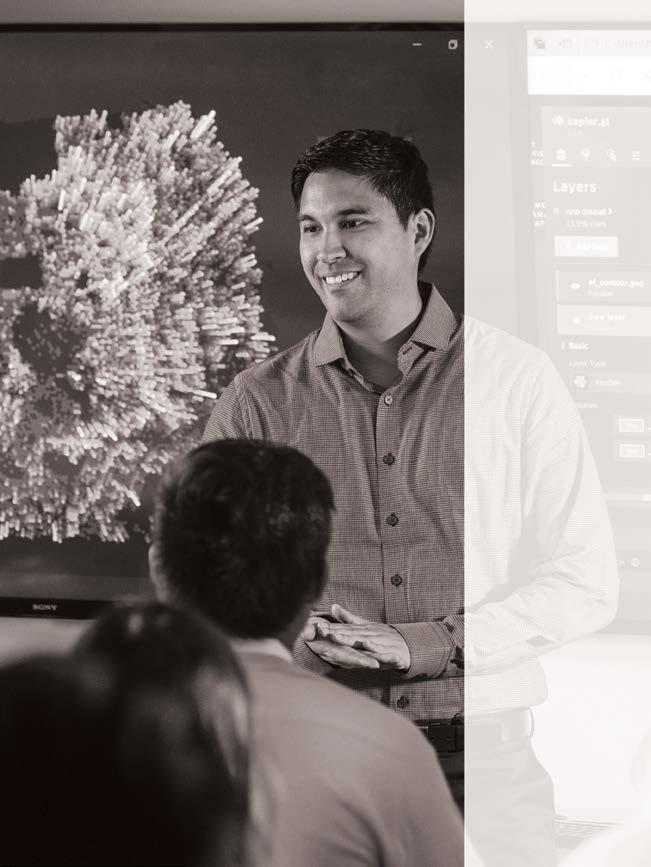
FALL 2022
Magazine IN THIS ISSUE Bringing Filipino Language and Culture Back to Hawai'i PAGE 22 Harnessing the Data Revolution Through a $10 Million Grant PAGE 32
Aloha,
Our mission at Chaminade University is one of service. We seek to empower, inspire and challenge our students so they can put their knowledge into action and serve their communities in powerful ways. We seek to maximize our capacity for positive change—across our programs and our campus. And we seek to partner with our stakeholders, working together to understand needs in our workforce and our neighborhoods so that we can help meet them.
We do all this because we believe a better, more peaceful world is possible.
But we cannot realize that future without the help of our entire Silversword 'ohana and many community supporters. They are vital in championing our work, in cheering on our students and in understanding that an investment in education today offers the promise of a brighter tomorrow.
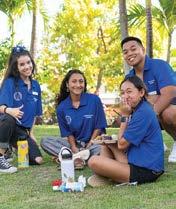
We are also incredibly grateful to our many partners in government and philanthropy who have recognized our excellence and innovation with significant grant funding for a host of projects. Most recently, we were honored to report the National Science Foundation had selected Chaminade to lead a groundbreaking $10 million grant project aimed at creating new leadership pathways into high-demand data science careers for students and professionals in Hawai'i and the Pacific region.
You can read more about this exciting initiative on Page 32.
With the transformational funding, our United Nations-affiliated sustainability center—CIFAL Honolulu—and Data Science program will launch the Alliance Supporting Pacific Impact through Computational Excellence (ALL-SPICE) to expand opportunities to a new, diverse generation of change-makers—equipped with the cutting-edge skills they need to drive sustainability goals forward.
Undoubtedly, the grant’s central goals dovetail with Chaminade’s strong focus on leadership development and community building. For evidence of that, you need go no farther than the pages of this issue of Chaminade Magazine, replete with examples of our faculty and staff members, students and alumni putting our mission into action and making a difference in countless people’s lives.
On Page 22, for example, you can read about a recent trip to the Philippines where Communication Professor Dr. Eva Washburn-Repollo led a group of educators interested in broadening their perspectives and creating more culturally informed curricula. The project was made possible by a prestigious $100,000 grant from the Fulbright-Hays Group Projects Abroad program.

We also have a great overview in this issue of our Parish Health program (Page 54), launched by the School of Nursing and Health Professions to give students the opportunity to offer one-on-one health screenings with parishioners after Mass or via telehealth appointments. Through the program, students receive invaluable, hands-on experience. Participants are given tools for better managing their health. It's a win-win—in service to the community. And speaking of service, you will not want to miss two profiles in this issue of outstanding alumni embracing all it means to be a Silversword. On Page 28, read about how Erin Kirihara ’06 is helping to break down barriers for women in the construction industry as an executive vice president at global construction and management consultancy firm Rider Levett Bucknall (RLB). Kirihara is also very generous with her time, volunteering to serve on the boards for several Hawai'i nonprofits.
Her message: “We have an obligation to make Hawai'i a better place to live.”
Kay Een, a proud 2002 graduate of Chaminade’s Forensic Sciences program, is also passionate about promoting diversity in the workforce. In fact, it is her job as the chief diversity and inclusion officer for the Naval Criminal Investigative Service. Starting on Page 30, read all about her journey from the military to Chaminade to her dream job at NCIS and why she believes so strongly in the power of equity.
All our programs are working hard to develop more leaders like these two inspirational women.
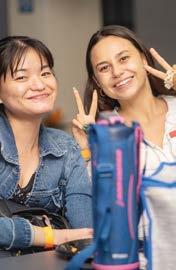
And the good news is we are continuing to expand our academic offerings to attract more of tomorrow’s leaders to our campus. Our newest graduate programs aimed at supporting community and workforce needs are the Doctor of Family and Marriage Therapy and the Ed.D. in Educational Psychology (Pages 46 and 57, respectively)—both of which launched after extensive conversations with community stakeholders.
Finally, I would be remiss if I failed to spotlight our generous Honor Roll of Donors—members of our Silversword ‘ohana who, as I elaborated on earlier, truly play a critical role in helping us to meet the promise of our mission. On Page 36, meet Jan Seymour ’76, who helped to establish the Fumiko Kanazawa Endowed Scholarship at Chaminade to honor the memory of a beloved aunt.
And on Page 17, read more about the continuing work made possible at Chaminade by the Kosasa Foundation. In August, Chaminade received a $25,000 grant from the foundation to promote pathways to college for rural Kaua’i high schoolers. This academic year, 40 students are enrolled in the program.
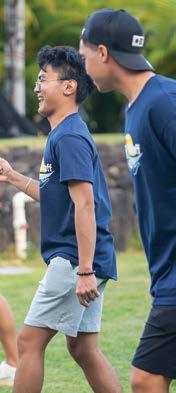

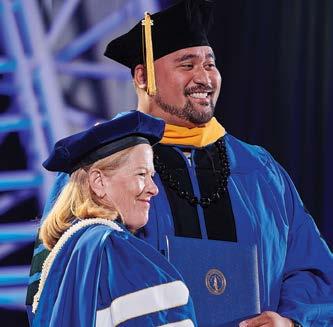

As is clear, there are so many accomplishments to celebrate in our Chaminade community—and so many goals yet to be achieved. All that success is getting noticed. We were excited to once again make a strong showing in the U.S. News & World Report’s Best Colleges rankings released in September, securing the no. 20 spot among top regional universities in the West (get details on Page 6).
While rankings do not tell the full Chaminade story, there is little doubt that our commitment to excellence and innovation played a significant part in our recognition from U.S. News & World Report. We also know that behind our programmatic wins and strong statistics you can find real students— with real dreams for making a difference in the world. We are here to make sure they get that opportunity.
Sincerely, Lynn Babington, Ph.D. President
BOARD of REGENTS LEADERSHIP BOARD of GOVERNORS
PRESIDENT
Lynn M. Babington, Ph.D.
PROVOST & SENIOR V.P. FOR ACADEMIC AFFAIRS Lance Askildson, Ph.D.
V.P. OF FINANCE & C.F.O. Aulani Ka'anoi
V.P. FOR MISSION & RECTOR Bro. Edward Brink, S.M.
V.P. OF ADVANCEMENT Gary Cordova
V.P. FOR ENROLLMENT MANAGEMENT & A.V.P. FOR STUDENT SUCCESS Jennifer Creech
V.P. OF ADMINISTRATION & GENERAL COUNCIL Christine Denton
V.P. OF UNIVERSITY COMMUNICATIONS & MARKETING Lisa Furuta
V.P. FOR STUDENT AFFAIRS & DEAN OF STUDENTS Allison Jerome
CHANCELLOR Rev. Oscar Vasquez, S.M.
CHAIR Keiki-Pua S. Dancil, Ph.D.
FIRST VICE CHAIR Rodney Harano, M.B.A. ‘84
SECOND VICE CHAIR John Field, M.B.A. '84 SECRETARY Karen Knudsen
Violeta A. Arnobit Gae Bergquist-Trommald Carolyn Berry Wilson Ismael Eustaquio ‘88 Lori Forman, Ph.D. Eric Fujimoto, M.B.A. '94 Melialani P. James Estelle Kelley, J.D.-M.B.A., Ph.D. Lydia Park Luis Bro. Joseph Markel, S.M. Senator Bennette E. Misalucha Lance A. Mizumoto, M.B.A. ‘92 Alison Tanaka, M.B.A. ‘15 David Underriner Bro. Edward A. Violett, S.M., Ph.D. Terrence L. Walsh, Jr. '93 Jeannine M. Wiercinski
EX OFFICIO
Lynn M. Babington, Ph.D. David Carter, Ph.D. Col. Christine M. Gayagas (Ret.), Ed.D Bro. Jesse O’Neill, S.M. Rev. Oscar Vasquez, S.M.
EMERITUS
Gary E. Liebl, L.H.D.
CHAIR
Col. Christine M. Gayagas (Ret.), Ed.D.
VICE CHAIR Anton Krucky
SECRETARY Blaine Rand Y. Lesnik, Psy.D.
Arnold M. Baptiste, Jr. Richard J. Blangiardi John C. Brogan
Margery S. Bronster, Esq. Sai Cheong Chui ‘76, M.B.A. ‘78 Bob Eisiminger
William H. Garrett Robert S. Harrison Warren H. Haruki Gary G. Hogan
Matthew D. Howard ‘89
Bro. Robert Juenemann, S.M. Michael F. Kerr, J.D. Lung-Nien Lee ‘88
Dawn O. MacNaughton, M.B.A. ‘93
RADM Joseph J. McClelland, Jr. (Ret.)
Joseph Melehan
Matthew Morgan, M.Ed. '02
RADM Kenneth P. Moritsugu, M.D., M.P.H., F.A.C.P.M., USPHS (Ret.)
Donald D. Rodrigues
Richard E. Tanaka
Vaughn Vasconcellos Gen. Francis J. Wiercinski, USA (Ret.) Albert Wong
EX OFFICIO
Lynn M. Babington, Ph.D. Keiki-Pua S. Dancil, Ph.D.
4 | CHAMINADE MAGAZINE
Thanks to a Fulbright grant, Communication Professor Eva Washburn-Repollo led a contingent of students to the Philippines.
Harnessing the Data Revolution Through a $10 Million Grant

The National Science Foundation (NSF) INCLUDES Alliance selected Chaminade University to lead a groundbreaking $10 million grant project aimed at creating new opportunities in STEM and data science careers for historically underrepresented populations across Hawai'i and the Pacific Region.
Chaminade No. 20 In Annual ‘U.S. News’ College Rankings
Chaminade University’s Hawai'i Guarantee
From Chaminade To Paris To Nashville and Back
Celebrating Our Graduates: Sprint Commencement 2022
Celebrating the Past and Future: Nursing Pinning and White Coat Ceremonies
Education Behind Bars: A Better Future Awaits
Kosasa Foundation Awards $25,000 To Chaminade’s Emerging Scholars Program
7
8
9
12
14
17
18
20
25
26
28
29
30
6
Pre-College Summer Institutes 2022
Economic Education Center for Excellence: Financial Literacy Starts Here
Student Finds Marketing Internships to Support Her Passion For Politics
Nonprofit Business Plan Competition 2022
Alumna Breaks Down Barriers in Construction Industry
Business Students Take Second in National Business Case Competition
Alumna's Forensic Science Passion Take Her to NCIS 22 Bringing Filipino Language and Culture Back to Hawai'i
32
COVER STORY 32 35
36
37
44
46
47
48
50
52 Chaminade
53 Virtual
54 School
55 2022
57
58
31
FALL 2022 | 5
FEATURES
Chaminade Hosts Pacific Region Data Science Challenge
Alumna’s Endowed Scholarship Creates Opportunities and a Better Future for Chaminade Students
Honor Roll of Donors
On the Hill–Connect and Create
Chaminade Launches Doctor of Marriage and Family Therapy Program
Mamoru and Aiko Takitani Foundation Supports Student Scholarships
Healthy and Sustainable Hawai'i Speaker Series
Chaminade Sets New Record on Academic All-PacWest Teams
to Add Men’s Baseball and Women’s Beach Volleyball to Athletics Program
Forum with Medical Team That Performed the First Pig-Heart Transplant
of Nursing and Health Professions Launches Parish Health Program
Hawai'i Catholic Schools Teacher of the Year
Chaminade University Launches Ed.D. in Educational Psychology Program
Notables
Alumni Notes
CHAMINADE NO. 20 IN ANNUAL ‘U.S. NEWS’ COLLEGE RANKINGS
In the 2022–2023 rankings, Chaminade clinched the no. 20 spot in the regional group.
That’s up from no. 25 in 2021-2022.
Chaminade President Lynn Babington, Ph.D., said the ranking underscores the university’s strong commitment to academic excellence, rigor and innovation. “Our team of faculty and staff members work incredibly hard to deliver on our service-focused mission and ensure our students can reach their goals,” Babington said. “Chaminade’s Best Colleges ranking is a testament to their unwavering dedication and tireless efforts to put Chaminade’s pledge to the community into action.”
Meanwhile, Chaminade jumped up in the rankings as a “best value” option—securing the no. 11 spot (from no. 21 last year). In the “best value” ranking, U.S. News & World Report assessed universities not only on academic quality but on the availability of need-based grants, scholarships and other financial aid.
Chaminade was also ranked no. 28 for “social mobility” (from no. 38 in 2021–2022).
The ranking measures the percentage of Pell Grant students who graduated.
The U.S. News & World Report’s Best Colleges rankings include assessments of approximately 1,500 U.S. colleges and universities. The rankings—in its 38th year—evaluate campuses' 17 measures of academic quality, including graduation rates, retention rates and faculty resources.
Chaminade’s undergraduate Nursing program, which launched in 2010, was also recognized. The Bachelor of Science in Nursing program was named among the best in the U.S., ranking in the top 42 percent. The school secured the no. 293 spot among nursing programs out of some 690 schools nationwide.
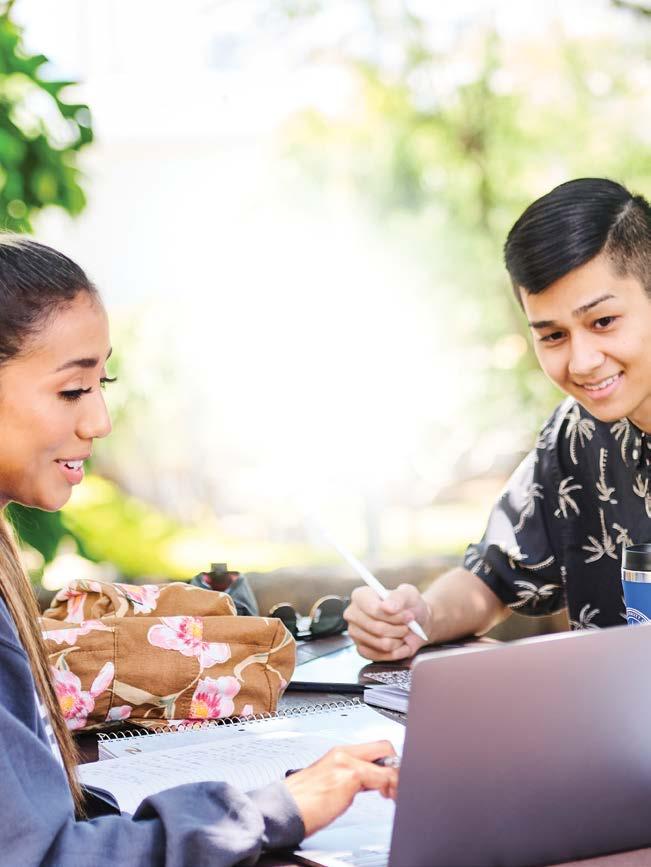 CHAMINADE UNIVERSITY IS PROUD OF ANOTHER STRONG SHOWING IN THE U.S. NEWS & WORLD REPORT’S BEST COLLEGES RANKINGS, WHICH ONCE AGAIN NAMED CHAMINADE AMONG THE TOP REGIONAL UNIVERSITIES IN THE WEST.
CHAMINADE UNIVERSITY IS PROUD OF ANOTHER STRONG SHOWING IN THE U.S. NEWS & WORLD REPORT’S BEST COLLEGES RANKINGS, WHICH ONCE AGAIN NAMED CHAMINADE AMONG THE TOP REGIONAL UNIVERSITIES IN THE WEST.
6 | CHAMINADE MAGAZINE
CHAMINADE UNIVERSITY’S HAWAI'I GUARANTEE
MATCHING RESIDENT TUITION AND 4-YEAR GRADUATION PATHWAY.
Chaminade University is proud to announce a new undergraduate tuition match and four-year graduation pathway program starting with next year’s incoming Hawai'i freshmen. This will ensure that a world-class, private education is within reach for even more families in the Islands.
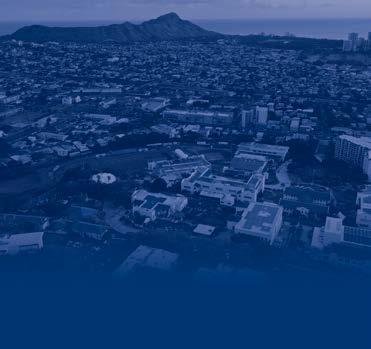

The Hawai'i Guarantee program will launch in Fall 2023 and provide all graduates of Hawai'i high schools entering as first-time freshmen with the exact same tuition rate as the University of Hawai'i at Mānoa’s annual resident undergraduate tuition and an achievable path to graduate in four years.
The tuition match will mean students eligible for the program will not pay a penny more to attend Chaminade University than the annual published tuition rate at UH-Mānoa—a groundbreaking affordability pledge that underscores Chaminade’s strong commitment to expanding access to educational opportunities.
If students follow all the steps in their Four-Year Graduation Guarantee and are unable to graduate in four years, Chaminade will cover the rest to get program participants to graduation day.
“Our new Hawai'i Guarantee program shows our serious commitment to help inspire and develop the next generation of Hawai'i leaders by providing Hawai'i high school graduates with a world-class education right here at home,” said Chaminade University President Dr. Lynn Babington.
“We are on a mission at Chaminade to put education in action for the public good—and the Hawai'i Guarantee helps us meet that goal," Babington added. "Hawai'i families have been grappling with no shortage of uncertainty in the last several years, but our Hawai'i Guarantee is something they can count on and will ensure more Hawai'i students are able to pursue higher education so they can make a positive impact in our community.”
Chaminade already has the highest four-year graduation rate among Hawai'i universities.
The University’s support network for all incoming freshmen makes sure that each student has a dedicated academic advisor who will help them craft an achievable plan for graduating within four years. Those wraparound supports will continue throughout a student’s four-year journey at Chaminade so they have the guidance and help they need every step of the way.
“Our Hawai'i Guarantee is a game-changer for incoming Hawai'i students and their families and underscores our commitment to affordability in education,” Assistant Vice President for Enrollment Management Abigail Hurgo said. “Chaminade’s small class sizes, dedicated academic advisors and faculty, leadership opportunities, and career development program, allow our students to turn their passions into the skills and knowledge they need to become the next generation of Hawai'i leaders.”
The program will apply to full-time, day undergraduates and can be used in conjunction with a comprehensive financial aid package, including grants and scholarships.
Students must apply to Chaminade University and submit their FAFSA by January 15, 2023.
Learn more about Chaminade University’s Hawai'i Guarantee at chaminade.edu/hawaii-guarantee
From Chaminade to Paris to Nashville and Back
University over the summer. Reached on an afternoon in July, Brockert was packing for a conference in Connecticut, where she would present her summer work.
At Vanderbilt, she studied misinformation in social media and how to reduce its spread.
“I’d love one day for social media companies to implement what I’ve found,” she said.
The Leadership Alliance opportunity included a full scholarship, covering Brockert’s room and board while studying in Nashville. She also got to enjoy a new city—and she wasn’t disappointed. “There is so much happening here,” she said. “It’s just really opened up my eyes and given me confidence.”
Brockert heads back to Chaminade this Fall for her senior year.
And she’s looking forward to encouraging her peers to try study abroad for themselves.
Brockert, a Psychology major who is minoring in Business Administration, spent the Spring 2022 semester in France through Chaminade University’s study abroad program. She stayed with a host family, took classes at the American Business School in Paris and, she said, tried to squeeze in as many opportunities to learn about French language, culture, society and day-to-day life as she possibly could.

“I took French in high school, but it was a huge learning curve,” she said. “And I was not afraid to play tourist. I visited every famous Parisian landmark that I possibly could … from the Arc de Triomphe to the Notre Dame Cathedral to the Seine. I wanted to really get a feel for the city and its people and I did.”
Brockert also broadened her experience by working, including at an insurance firm and as a babysitter.
She said the thing that surprised her the most was how affordable and seamless study abroad was at Chaminade. She was able to earn credit toward her degree and her tuition was nearly the same. “I did my homework and realized this was a great way to broaden my learning and see the world,” she said.
But Brockert’s whirlwind year didn’t stop there.
Before she jetted off to Paris, Chaminade’s Undergraduate Research and Pre-Professional Programs team encouraged Brockert to apply for a summer Leadership Alliance internship. The program is designed to prepare underrepresented minorities in academic research and graduate study.
It was while she was studying abroad that Brockert learned she had been selected to conduct psychology research at Vanderbilt
“It’s been so fun. If you’re a go-getter and you’ve always wanted to study abroad," she said, "Chaminade is the perfect place to get going and do that. They’re flexible and they want to make it work for you.”
She added, “If you let go of your fears, so many opportunities are going to open up for you.”
After graduation, she intends to “hit the ground running.”
“Eventually I really want to start my own business,” said Brockert, who was born and raised on O'ahu and attended La Pietra-Hawai'i School for Girls. She also has the travel bug and is excited about pursuing new opportunities— potentially even overseas. “You have to make the world your oyster. It’s not just going to happen,” she said. “With a positive outlook and spirit, you can accomplish anything.”
Spoken like a true Parisian.
TOMMIANNE BROCKERT ‘23 LOVES STUDYING, WORKING AND LIVING IN HAWAI'I. BUT SHE JUMPED AT THE CHANCE TO STUDY ABROAD—AND SHE HOPES TO CONVINCE OTHERS TO DO THE SAME.
8 | CHAMINADE MAGAZINE
Celebrating Our Graduates: SPRING COMMENCEMENT 2022
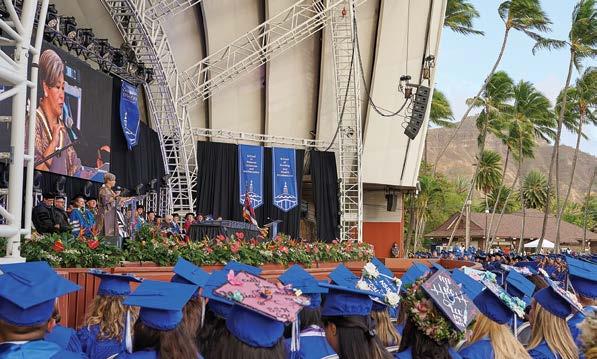
“When you walk out of here today, remember those who walked with you, remember all those who helped you get here, and remember what it means to be a servant leader—even when it’s tough,” said Vares-Lum, in her address to graduates at the Waikīkī Shell. “Be a light wherever you go, learn, listen, teach, encourage. … Embrace where you come from and don’t let others define who you are.”
Vares-Lum is the first woman and Native Hawaiian to be selected to lead the East-West Center. In speaking to graduates, she described her humble beginnings and her struggles at home and at school.
“Most people who knew me then would never have imagined that I would one day be standing before you—as your commencement speaker, a retired two-star general and now the head of one of our region’s most respected institutions of learning, the East-West Center,” Vares-Lum said.
“Fortunately, I spent many of my summers growing up with my grandparents on Maui. They knew everything about hard work and commitment. I watched and learned. We have so much to learn from our kupuna . It kindled a drive inside of me that said, ‘I refuse to be defined by life’s circumstances.’”
VALUE YOUR 'OHANA , EMBRACE YOUR KULEANA AND REMEMBER THAT OBSTACLES ARE MEANT TO BE OVERCOME. THAT WAS THE MESSAGE EAST-WEST CENTER PRESIDENT SUZANNE PUANANI VARES-LUM HAD FOR CHAMINADE UNIVERSITY’S SPRING 2022 GRADUATES AT THE UNIVERSITY’S 64TH ANNUAL COMMENCEMENT EXERCISES ON MAY 7.
FALL 2022 | 9
The message was well-received by graduates, who were faced with a host of new COVID-19-related challenges and were able to tackle them all to achieve their goals. The Commencement included about 540 students in all, including 140 undergraduates who qualified for Honors recognition.

Melanie Kushi was graduating with her Doctor of Psychology in Clinical Psychology (PsyD) degree, and said the graduation represented the end of a “long journey” and the beginning of a new adventure. She has been selected for a post-doctoral position at Wai'anae Coast Comprehensive Health Center.
“I couldn’t have done this without the love and support of my family,” she said. “It’s a lot of hard work.”
Fellow PsyD graduate Daniel Kinikini couldn’t agree more and added he’s thankful to his professors at Chaminade and his fellow cohort members for helping him get through the toughest days. “I’m looking forward to the future,” said Kinikini, asserting that the pandemic has underscored the importance of a robust mental healthcare system in Hawai'i. “Being able to work with, especially the underserved population, that’s something I’m really passionate about. Many doors are open now.”
Educator Brandy Wilson was ecstatic after graduating with her Master of Arts in Teaching degree, and said she’s planning to bring her new skills to her current work. “I love preschool,” said Wilson, who teaches at Mōkapu Elementary in Kailua. “Being at Chaminade has helped me so much to learn strategies for working with both general education and special education students. I will continue to do that.”
The Commencement ceremony began with a special invocation from Bro. Edward Brink, S.M., vice president for Mission and Rector at Chaminade. President Lynn Babington, Ph.D., then addressed graduates, congratulating them on all they have accomplished—including in the face of adversity.
“During the past two years, we have all lived with uncertainty. You had to pivot to online learning, missed seeing some of your friends, faculty and staff, and were never able to properly celebrate all of your accomplishments in the community,” said Babington, in her speech. “You have learned the power of sacrifice because you have made necessary ones to keep yourself and your families safe.”
She noted that the Class of 2022 has demonstrated not only resiliency, but tenacity and grace in responding to an ever-changing landscape of obstacles. “You give us all great hope for the future,” she said. “You are our future leaders and we are confident in your ability to succeed.”
In addition to graduates, two extraordinary members of the community were honored at the Commencement ceremony: Kitty Sullivan Wo and Vaughn Vasconcellos were this year’s recipients of Chaminade’s Doctor of Humane Letters honorary degree.
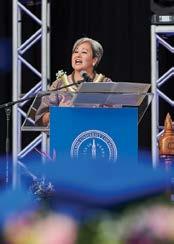
Sullivan Wo, director of the Sullivan Family of Companies, is a philanthropist and previously
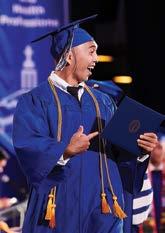
served on Chaminade’s Boards of Governors and as chair of the Board of Regents. In her support of Chaminade’s mission, Sullivan Wo was instrumental in a major fundraising campaign and dedicated the Sullivan Family Library. Vasconcellos, who founded Akimeka, LLC, has worked throughout his career to bolster opportunities for young people. He also previously served as chair for Chaminade’s Board of Regents and currently serves on Chaminade’s Board of Governors and Hogan Entrepreneurial Program Advisory Board.
The undergraduate Commencement speaker was Albert Respicio, who majored in Communication. In celebrating his fellow
CONTINUED
FROM PAGE 9
“Be a light wherever you go, learn, listen, teach, encourage. ...
Embrace where you come from and don’t let others define who you are.”
10 | CHAMINADE MAGAZINE
Suzanne Puanani Vares-Lum East-West Center President Commencement Speaker
graduates, he asked them to remember all those who made the day possible. “We didn’t do this alone,” he said. “Thank you to all our parents, friends, teachers and everyone else in between that believed in us when we didn’t; when we struggled to think that we could.”
Graduate speaker Kiana Dizon, who received her Master of Science in Counseling Psychology degree, encouraged her fellow Silverswords to make big dreams and then go for them—just like she did. “I never thought I could make my dreams a reality until I pursued a passion at an institution that empowered me to do so,” she said. "Adding degrees speak not only to a person’s intellect but to their character."
Nursing graduate Lara Domogma said she feels the same way.
She called the day “surreal” and said she was moved to be able to share it with her family.
“This is really happening,” she said, beaming. “I’m here. I can’t believe it.”
While the Commencement ceremony was the main event of the weekend, the celebrations for graduates actually started on May 6 with a special Baccalaureate Mass at the Mystical Rose Oratory. The gathering, an annual tradition, is an opportunity for the Chaminade community to reflect on the accomplishments of the term’s graduating class and give thanksgiving for all they have.
Kaimaile Leopoldo, a Master’s in Teaching graduate, said she’s most grateful for the positive impact she’ll have on young people’s lives. Leopoldo said she went into preschool teaching because she loves working with very young children and serving as one of their very first teachers. “This degree means so much,” she said. “Having students take what I teach into their lives, that’s what I’m excited about.”
Joseph Durocher was at Commencement to celebrate the completion of his bachelor’s degree in Biochemistry. But he won’t be away from Chaminade for long: He’s hoping to apply to the university’s One Year MBA program and is interested in pursuing a future in biotechnology.
For now, though, he’s letting his newest title—college graduate—sink in.
“Being here right now,” he said, “it definitely feels amazing.”
Watch the recap of our 2022 Spring Commencement
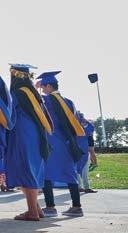
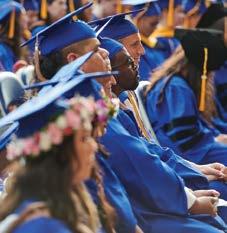
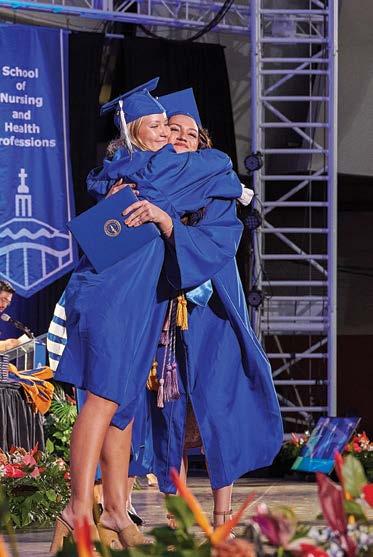
FALL 2022 | 11
CELEBRATING THE PAST AND FUTURE: NURSING PINNING AND WHITE COAT CEREMONIES

Pinning ceremonies later grew to mark the beginning of a nurse’s career.
THE JOURNEY TO BECOMING A NURSE REQUIRES HARD WORK, ENDURANCE—AND
And leading up to the finish line, there are milestone moments aimed at recognizing students’ achievements. That’s exactly what the Nursing Pinning and White Coat ceremonies are all about, two time-honored traditions in the field that underscore just how important nurses are to the community, congratulate students on their accomplishments, and help forge a strong nursing fellowship.
Chaminade’s School of Nursing and Health Professions held the ceremonies inperson, welcoming not only nursing students but members of their families and faculty mentors to celebrate.
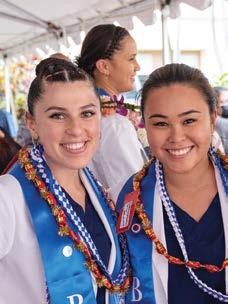
The Pinning Ceremony for 57 graduating Nursing seniors was on May 7, and loved ones had the opportunity to do the pinning honors. As Nursing and Health Professions Dean Rhoberta Haley, Ph.D., explained at the event, the roots of the tradition date to the 1860s when Florence Nightingale—known as the founder of modern nursing—was awarded the Red Cross of St. George for her service.
“A pinning ceremony is a time to welcome newly graduating nurses to the profession,” Haley told attendees. “We gather for this occasion to mark the transition from student nurse to graduate nurse, and to celebrate the start of a professional practice in nursing.” Haley added Chaminade’s unique Nursing pin symbolizes a life dedicated to professional health care and service to others.
“Please wear it proudly,” she told graduates, “and with our very best wishes.”
Leilani Higashi intends to do just that. She said the ceremony was the perfect conclusion to her preparation as a nurse and the perfect beginning to her life as a nurse. “Pinning to me is like the final recognition. There’s no more, ‘Let me check with the nurse.’ We are the nurses,” she said.
Higashi said she went into nursing after growing up taking care of her grandfather.
“I got to meet so many amazing nurses that were part of his care team,” Higashi said. “I wanted to provide that same care and comfort that they did for us to other people. Now I’m looking forward to new adventures, and I can’t wait to get out into the workforce and help my community.”
Graduating senior Zane Biscocho was beaming after the ceremony.
“This is a congratulations and a ‘you made it,’” he said, adding that he hopes to serve in Hawai'i.
PLENTY OF SUPPORT ALONG THE WAY. IT’S A LOT LIKE A MARATHON.
“We gather ... to mark the transition from student nurse to graduate nurse, and to celebrate the start of a professional practice in nursing.”
12 | CHAMINADE MAGAZINE
- Nursing and Health Professions Dean Rhoberta Haley, Ph.D.
Katelyn Toba also described the Pinning Ceremony as a celebration. She said the four years of nursing school have been difficult, but she has appreciated the support of her loved ones, friends and professors. “Chaminade has that family spirit and it helped me over the years,” she said.
Graduate Taryn Sagapolu said the gathering “felt like an accomplishment after all the hard work.”
Sagapolu attended the ceremony with her parents, both of whom are nurses.
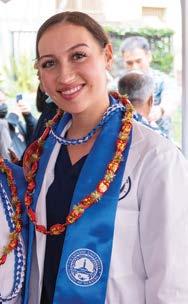
“We know it’s the hardest thing ever,” said her mother, Sharon, after the event. “She saw us both come home exhausted, especially during the COVID-19 pandemic. But she never gave up.” Sagapolu’s father, Kamaki, agreed. “We are so proud of you,” he told his daughter, giving her a big hug.
A day before the Pinning Ceremony, 122 members of Chaminade’s Nursing junior class and their relatives and friends gathered for the White Coat Ceremony. The event recognizes students’ entry into the health profession as they undertake clinical education. After receiving their white coats, students took the International Council of Nurses pledge to uphold nursing ethics and deliver the best care.
In her address to attendees, Haley pointed out that nursing is the most trusted profession in the country. It is critical to maintain that bond of trust, she added, and for every nursing student to fully understand the duties and obligations of the profession before they ever see their first patient.
“Nursing is both a respected science and a caring art,” Haley said. “Your success will depend on your ability to understand and apply ethical and professional values. Over a lifetime in nursing, you will repeatedly turn
to these values, depending on them as the foundation of your practice.”
Among those key values: responsibility, trustworthiness, honesty and respect. “At Chaminade, we believe in these values and are committed to helping you achieve your highest level of performance and providing assistance when needed,” she said. “It is a privilege for Nursing faculty and staff to promote professionalism, and share what we know and love about nursing with our students.”
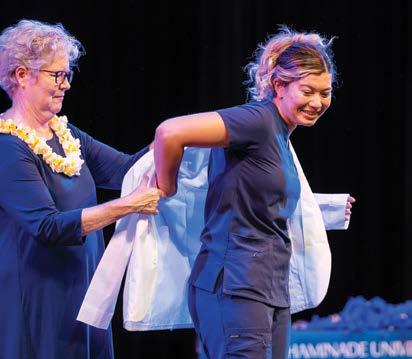
The White Coat Ceremony is traditionally conducted during students’ sophomore year, but the COVID-19 pandemic meant the event couldn’t be held last year. A ceremony for sophomores will be held this Fall.
Junior Autumn Fairall was moved after getting her white coat.
She said she has wanted to be a nurse since she was 10, when she was diagnosed with leukemia and “blessed with a kind and capable medical team. The nurses who took care of me daily inspired me.”
Fairall said that day-to-day, it’s easy to focus on the challenges of nursing school.
But the ceremony reminded her of all
that she has overcome and accomplished. “The White Coat Ceremony was a time of celebration, both for the hard work completed and the blessings that will come,” she said. “I am looking forward to working as a nurse and giving back what previous nurses gave me.”
Student Hannah Hovestol said she went into Nursing because she wants to serve her community, especially in the areas of mental health and psychiatric nursing. After receiving her white coat, she said she was proud and humble. “The ceremony was a confirmation and validation of the hard work that I have devoted to my studies and nursing obligations,” she said. “Attending this ceremony also demonstrated the communal nature of the profession, being there with my classmates.”
She said those classmates are like family now.
“It reminded me that even when I graduate and become a nurse, I will never be alone as there is a community in the healthcare team to collaborate with,” she said. “The end of my educational chapter is near, but my future nursing chapter is yet to be written. I am so excited to see what the future holds.”
FALL 2022 | 13
A Better Future Awaits
DR. JANET DAVIDSON IS A LEADER IN CRIMINOLOGY. SHE HAS SPENT DECADES CONDUCTING RESEARCH IN THE FIELD, MENTORED HUNDREDS OF STUDENTS, AND PUBLISHED A LONG LIST OF PEER-REVIEWED PAPERS IN SCHOLARLY JOURNALS. PUT SIMPLY, SHE’S SEEN IT ALL—SO SHE WAS SURPRISED TO BE SURPRISED WHEN SHE STARTED TEACHING BEHIND BARS.
In 2021, she spearheaded Chaminade’s innovative effort to launch a Second Chance Pell Grant program at Hālawa Correctional Facility. Inmates are given the opportunity to earn an associate’s degree in Business Administration after completing core and major-specific courses over two and a half years.
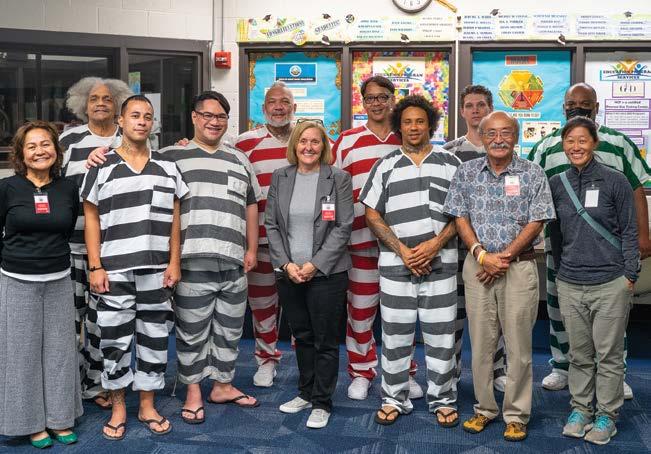
In addition to overseeing administration of the initiative, Davidson is one of the teachers for participants—nine in all after some natural attrition in the inaugural cohort. She expected classes with the
inmates to be interesting, exciting and different. But she didn’t count on learning so much, too.
“It’s incredibly rewarding,” said Davidson, who is also vice provost for Academic Affairs at Chaminade. “They’re eager and they want to learn, and they do their homework. I’m so proud Chaminade was able to launch this program. We educate for service, justice and peace, and this program does that.”
Davidson said years of research have shown educational programs
EDUCATION BEHIND BARS :
14 | CHAMINADE MAGAZINE
in prisons help bolster job opportunities for people once they get out of prison and decrease the chances they’ll re-offend.
And while there’s a stigma around inmates, Davidson said, the students in the cohort continue to impress her. “They’re just the best,” she said. “They’re not distracted by cell phones. They know this is a privilege so they’re engaged. It’s just a pleasure to have them in the classroom.”
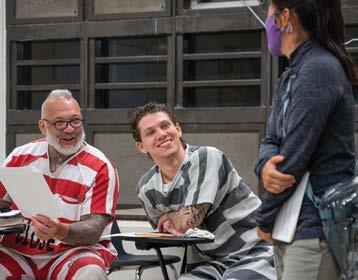
Albert Batalona is one of those students. He said he applied to participate in the “second chance” program because he wants to be able to secure a better-paying job after he gets out of prison. He also hopes society sees his degree as proof that he can make a positive contribution to society.
“I’m really trying my best to learn all I can and take this seriously,” Batalona said, adding he’s enjoyed being able to connect with professors. “They have come to really teach us, not just go through the motions. They held no prejudice against me for my past mistake, something I’m not used to.”
Participant Anthony Chatman said it’s tough to always be judged by those past mistakes, but he’s hopeful Chaminade’s program could help change that. “Many in our community feel that we shouldn’t be given a
second chance at freedom, let alone given the opportunity to educate ourselves,” he said.
That’s something John Granger has grappled with, too.
The 37-year-old said earning an associate’s degree through the prison program will give him an opportunity to start over. “I have for a while had some good ideas, but I lacked the resources to convert those ideas into dreams and those dreams into goals,” said Granger, a Maui resident. “I believe that not only if you know better you do better, but if you know deeper you will achieve greater.”
Kelson Akeo said he wanted to apply for the program for a simple reason: he wanted to be the first person in his family to get a college degree. “I wanted to prove to myself that I can be more than just a construction worker,” he said. “I can be a person who can utilize both mind and body.”
Akeo said while he is still serving his time, he’s beginning to see a new and brighter future for himself.
“Earning this degree will show me that I am worthy of having a brilliant future,” he said, adding his experience so far in the program has been a “rollercoaster” of emotions. Sometimes, he’s feeling proud about how
far he’s made it. Other times, he feels overwhelmed and wants to give up.
“But then I hear that little voice saying to me, ‘you got this’ since enrolling into this program and working towards my degree changed me to be more appreciative to those who believe in giving second chances,” he said, adding he is so thankful to his professors and their belief in him.
“These instructors make me feel free again, and that is a very rare feeling to have in prison.”
Davidson said it has been incredibly rewarding to see the program’s students build their confidence bit by bit as they tackle new assignments and grasp new concepts. Together, the cohort has completed a variety of courses since launching in the fall of 2021, including business administration, accounting, English, communication, biology and math.
Davidson said it’s a joy teaching at the prison especially in her most recent course, Contemporary Issues in Criminal Justice. She said while the participants obviously bring personal experiences to the topic, they have focused on broadening their perspective with readings and class discussions.
“They wanted to understand the larger context and that’s powerful,” she said.
“[Participants] know this is a privilege so they’re engaged. It’s just a pleasure to have them in the classroom.”
FALL 2022 | 15
Janet Davidson, Ph.D. Vice Provost, Professor of Criminology and Criminal Justice
CONTINUED FROM PAGE 15
She called one of the students her “encyclopedia” because he’s so well-read and frequently brings newspaper clippings to class that connect with what’s being taught. Another student finished his GED in prison and can’t wait to finish the AA. “I’ve seen him coming into his own,” Davidson said.
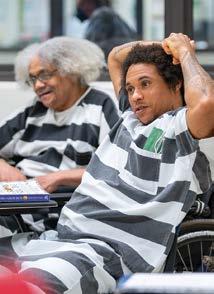
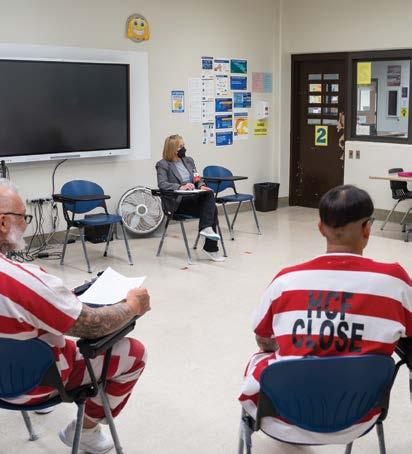
Keola Rapoza chose to join the program because he wanted his years behind bars to count for something. He will also be the first person in his family to earn a college degree. “My experience so far has been awesome even though I’m doing a college program in prison and not in a college campus setting,” he said. “What I like most about this program is the professors are patient with us.”
Patient, he added, as in understanding inmates can’t always get access to the prison’s learning center and are sometimes further restricted by COVID-19 lockdowns. And Rapoza said he’s proud to be paving the way for other inmates in the islands and setting a positive example. “Education is the most important thing in life,” he said. “I feel if everybody in this world was educated, there would be world peace.”
Nikkos Gordon has wanted to pursue a college degree since he was sentenced in 2012, and the Chaminade program has allowed him to think about what’s next in life. “I wanted to prove to others and myself that I can do this and I’ve always been able to do this,” Gordon said. “I wanted to show myself that I’ve changed and grew from the teenage boy who didn’t care much about pursuing a higher education. This program has shown me there are people who won’t treat me like an animal.”
Gordon added while he’s faced many obstacles on his academic journey, he’s determined to move forward. “I feel like knowledge is power, and we can only change through education,” he said. “Society is so focused on retributivism it forgets that we’re still people even though we’ve made mistakes.”
Raphael Holley is so engaged in soaking up new knowledge he frequently writes down the books his professors mention so he can ask his family to order them and send them his way. “The experience has been a blessing for me,” he said. “It helps me to stay out of trouble and it has given me another chance.
“Knowledge is power and we can only change through education. Society is so focused on retributivism it forgets that we're still people even though we've made mistakes.”
16 | CHAMINADE MAGAZINE
Second Chance Pell Grant Participant, Nikkos Gordon
Enrolling in this program and working towards my degree has changed my perspective.”
As part of the program, federal Pell Grant funding—through a pilot program—and private donations cover the costs of all tuition, books and fees. Students had to apply and be selected for the first cohort.
COVID-19 presented an additional obstacle, including frequent pandemicprompted lockdowns.
Davidson said the cohort will graduate in Spring 2023 and the next group will begin that Fall Term.
“If we want safer communities, if we want healthier families, if we want people who are incarcerated to have a chance when they come out, these are the types of rehabilitative programs we should be offering,” she said. “The idea is to shift the mindset. It will cost society less in the end.”

Ronald Page can attest to the power of the program.
He said the classes and discussions keep his mind sharp—and leave him wanting more.
“I know I’m doing something positive for myself,” he said.
KOSASA FOUNDATION AWARDS $25,000 TO CHAMINADE’S EMERGING SCHOLARS PROGRAM
CHAMINADE UNIVERSITY RECENTLY RECEIVED A $25,000 GRANT FROM THE KOSASA FOUNDATION IN CONTINUED SUPPORT OF ITS EMERGING SCHOLARS EARLY COLLEGE PROGRAM. NOW IN ITS SECOND YEAR, THE PROGRAM IS DESIGNED TO PROMOTE PATHWAYS TO COLLEGE FOR RURAL KAUA'I HIGH SCHOOL STUDENTS.
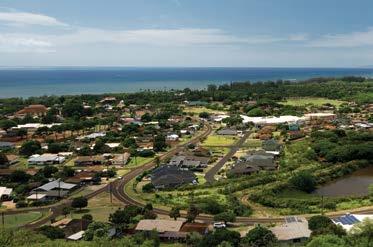
Open to qualified high school juniors and seniors, the Emerging Scholars program gives students a chance to discover and explore their passions and academic interests while earning dual-enrollment (high school and college) credits. For the 2022–2023 academic year, the program plans to enroll 40 Kapa'a High school juniors and seniors.
“We are extremely proud of our Emerging Scholars Early College program and grateful to the Kosasa Foundation for its ongoing support,” said Chaminade President Lynn Babington, Ph.D. “Programs like this allow Chaminade to provide access to college education for rural high school students, enhancing their enrichment opportunities and ability to grow as civic minded individuals.”
The Emerging Scholars Early College program is comprised of distance learning, featuring Chaminade faculty and guest speakers. At the beginning of each semester, a team of Chaminade faculty and staff will visit Kapa'a High School for an orientation with students, parents and teachers. At the completion of the academic year, students will participate in a culminating event on Chaminade’s campus, where they will stay in the residence hall and enjoy a sample of college experience.
In its first year, the Emerging Scholars program on Kaua'i, which was also funded by the Kosasa Foundation, had a cohort of 24 juniors and seniors from Kapa'a High School.
FALL 2022 | 17
Pre-College Summer Institutes 2022
“COOKING WITH CHEMISTRY”
“THINK LIKE A CHAMPION” “PSYCHOLOGY OF HAPPINESS”
THOSE MIGHT SOUND LIKE GREAT READS—OR FASCINATING TED TALKS. BUT THEY WERE ACTUALLY SOME OF THE ENGAGING AND HANDS-ON COURSES OFFERED AT CHAMINADE UNIVERSITY OVER THE SUMMER TO GROUPS OF HAWAI'I HIGH SCHOOLERS.

Above and right: Dr. Francis
a Cooking with Chemistry course.
students

The students were participants in Chaminade’s Summer Institutes, made possible at the university thanks to a partnership with the federal GEAR UP, an acronym for Gaining Early Awareness and Readiness for Undergraduate Programs.
The workshops were designed to give high school students a taste of college—and get them hooked.
Participants this year for the seven, two-week sessions included ninth to 12th graders from Farrington, Kaimukī, Ānuenue and McKinley high schools. And in addition to going on field trips and tackling fun projects, they also got the chance to attend co-curricular sessions on college readiness. The topics covered everything you would need to know as you prepare to graduate from high school and plan for college, including applying for financial aid, navigating admissions and student life.
PURE IMAGINATION
Aaron Williamson, assistant professor of Accounting, taught a session called, “The Successes of Pure Imagination: Business Development and Entrepreneurial Mentorship.” He said the course was designed as an immersion into the world of entrepreneurship—from business plan development, brainstorming sessions, strategic thinking skills-building and the application of “principles of success” in daily life.
“The entire process of teaching the course was memorable—from idea inception to business plan presentations,” he said. “Having a small part in assisting students to see how an idea can impact the world, and developing theoretical businesses that will be on the streets of tomorrow is so enjoyable.”
Sakai-Kawada leads
in
18 | CHAMINADE MAGAZINE
Assistant Professor of Education, Dr. Travis Mukina, unteaches some bad habits during his Creating Number Sense to Increase Love of Math course.
COOKING WITH CHEMISTRY
In Dr. Francis Sakai-Kawada’s “Cooking with Chemistry,” students tie-dyed their lab coats to better understand the chemistry of dyes, made their own bars of soap as they explored the properties of saponification, and took chemistry into the kitchen to make butter, mayonnaise, boba and ice cream.
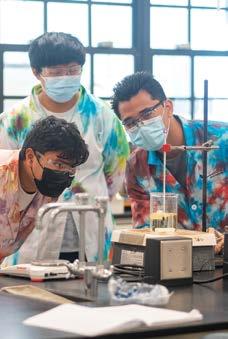
“The goal was to develop activities that were hands-on and engaging,” he said. “We had the creative license and flexibility to tie underlying scientific and chemistry concepts to every activity. Our priority was to incorporate an element of fun. We wanted our students to see that so much of what we deal with in our daily life can be related to chemistry, from food to household cleaning products.”
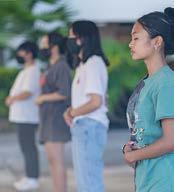
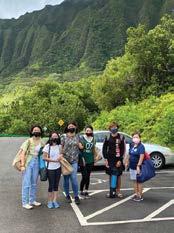
Kawada added that students started the course a little shy, but slowly opened up.
And the highlight of the session: visiting the IL Gelato Factory to talk story with owner Dr. Dirk Koeppenkastrop (a fellow chemist), who discussed his path from a chemistry lab to studying the art and science of gelato in Italy, and the “perfect ratio of ingredients” that goes into the sweet treat.
PSYCHOLOGY OF HAPPINESS
Dr. Abby Halston, an assistant professor of psychology at Chaminade and clinical director of the university’s Marriage and Family Counseling program, taught “Psychology of Happiness”—which incorporated everything from guided meditation and breathing to personal journaling.
Students also put together personal stress management plans, worked to identify their hopes and dreams for college and beyond, and participated in mock career development interviews. The group also got to go on a field trip to Beyond Monet, an immersive experience into the artist’s works.
“I wanted to create a fun and life-changing institute where high school students could gain deep personal insight into their psychological wellbeing while learning personal management skills that could be utilized throughout their lifespan,” Halston said. “We focused on understanding the keys to happiness … and the power of our mindset to achieving our hopes and dreams.”
She added, “I cannot wait until next summer’s institute!”
FOR THE LOVE OF MATH
For the Summer Institutes course on “Creating Number Sense to Increase Love of Math,” Assistant Professor of Education Dr. Travis Mukina wasn’t just teaching math fundamentals but unteaching some bad math habits. “Most days consisted of mental math activities that forced students to view numbers in ways their elementary school teachers did not allow,” Mukina said. “We broke numbers apart, changed their values and accommodated for the change at the end of the problem.”
“Hands-on manipulatives were also used daily to allow students to visually see how the numbers were working with each other in multiple different strategies," Mukina added. "Every activity ensured the students were learning from each other rather than from me. It was amazing to witness!”
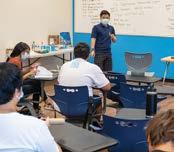
He said one of the big takeaways for students was that math isn’t a set of rules and procedures to memorize but about creativity and flexibility. Mukina also wanted participants to see how math can be used seamlessly in everyday life—and how even complicated things can be broken down.
“I feel so honored to be part of this summer institute,” he said.
LIVING PONO
For the “Living Pono” institute, School of Nursing and Health Professions Professors, Jennifer Nafarrete and Edna Magpantay-Monroe covered a wide range of health topics—from nutrition to human anatomy and physiology to reproductive health. Along the way, students tried their hand at cooking, engaged in some friendly competition and put together presentations to tackle big topics.
Magpantay-Monroe said students really enjoyed the concepts of emotional intelligence and mindfulness, and especially loved their field trip to Ho‘omaluhia Botanical Garden—where they were challenged to strengthen their ability to “notice” and “be with nature.”
“I really enjoyed being a source of information for these students—helping them realize self-care is important, but they also need to be self-aware of what is happening around them,” she said. “Being with nature helped increase their capacity to be mindful and reduce their stressors.”
Students participate in guided meditation in the Psychology of Happiness course.
Living Pono institute with Dr. Edna Magpantay-Monroe
FALL 2022 | 19
CONTINUED FROM PAGE 19
Nafarrete added she was also happy to give students actionable, healthy solutions they can use everyday—like recipes. “My thought process was to find fun ways to engage students into making conscious choices about their health while considering how it affects the environment,” she said.
ECONOMIC EDUCATION CENTER FOR EXCELLENCE: FINANCIAL LITERACY STARTS HERE
WHAT DOES COOKING HAVE TO DO WITH ECONOMICS? DR. GUANLIN GAO IS GLAD YOU ASKED.

Gao, a professor of economics and director of the Economic Education Center for Excellence (EECE) at Chaminade University, is on a mission to bolster financial literacy, education and research in Hawai'i. That’s why on a recent weekday she was cooking with a group of teens after giving them a budget to plan a menu.
Students participated in a budgeting competition for the "Think Like a Champion" course.

THINK LIKE A CHAMPION
Dr. Guanlin Gao, associate professor of Economics at Chaminade and director of the Economic Education Center for Excellence, focused on personal finance literacy in her course, “Think Like a Champion.” She wanted students to walk away with a better understanding of how to handle money.
“We spent one day visiting a local financial institution to learn more about how they operate and contribute to managing personal finances,” Gao said. “We spent another day on a fun team competition that involved budgeting, shopping and cooking. We even played a game that was all about inflation.”
Gao explained that the point of all the exercises was to help students see how better (and smarter) financial decisions ultimately lead to happier lives. “Interacting with the students was my favorite part,” she said. “For many of them, our trip to a bank was the first time they’d seen an actual vault. During our cooking competition, they all made nutritious meals. The best part: they were so proud of themselves.”
The exercise was part of a hands-on financial literacy workshop for Hawai'i high school students—and one of the economic center’s latest educational offerings. With the support of HawaiiUSA Federal Credit Union and Hawai'i State Federal Credit Union, the EECE also welcomed 28 Deapartment of Education teachers to campus from 15 O'ahu K-12 schools for an innovative educator training program. The aim: help them incorporate accessible and real-world financial literacy lessons into their curriculum.
“We’re here to help people understand just how important economics is to their everyday lives. Financial literacy education has the power to promote economic empowerment, ultimately strengthening our communities, our families and the broader local economy,” Gao said.
With the support of community stakeholders and several organizations, Chaminade launched the Economic Education Center in 2021 with an ambitious mission: “To advance prosperity and economic justice in Hawai'i and the Pacific Region through integrated economic education, training and research.”
20 | CHAMINADE MAGAZINE
Gao notes that financial literacy in Hawai'i is a significant area of need.
Nearly seven in 10 Hawai'i residents are considered “financially unhealthy.”
Approximately 59 percent of Hawai'i families report they’re struggling financially. And while 21 states require high school students to complete a personal finance or financial literacy course, Hawai'i isn’t one of them.
“We use a train-the-trainer approach at the center,” Gao said. “In other words, our educational approaches, initiatives and projects have exponential power because
everyone who comes through our Center has the tools and the capacity to pass on what they’ve learned on to others.”
Chaminade President Lynn Babington, Ph.D., said the university was also the perfect place to house the Economic Education Center for Excellence because of its wealth of academic expertise, strong connections with the community and institutional mission of public service.

“The center has not been operating for long, but it is already making a positive impact in the community,” Babington said. “Over the last year, we have also learned just how strong the demand for economics education and financial literacy is across the state. We look forward to continuing our expansion of the Center’s programming to reach more Hawai'i educators and students.”
Gao said the center is focused on:
• providing accessible training programs to K-12 educators and students;
• engaging with community networks to bolster financial literacy discussions;
• undertaking research that explores barriers to economic empowerment;
• and demonstrating measurable outcomes and impacts.
She added that another key focus is offering educational programming on the Neighbor Islands. “We want to reach people statewide with high-quality teacher training
and financial literacy tools, and we’ve already started to make connections with Neighbor Island teachers and schools,” Gao said.
Since kicking off in April 2021, the center has already offered hands-on training opportunities for teachers and workshops for students—like the Summer Research Institute seminar where Gao found herself cooking with teens. She said the students received $15 to cook a nutritious meal for a family of four. Along the way, they learned key skills, from budgeting to product affordability and planning.
Also as part of the workshop, the students visited HawaiiUSA Federal Credit Union and walked into the vault. The idea was to explore the importance of personal banking and savings, and make financial institutions less mysterious.
Gao said the teacher training seminar is just as hands-on.
Educators round out the workshop by sharing their lesson plans with their colleagues and walking through the exercise together. “Teachers are passionate about sharing these important financial literacy skills with their students,” said Gao, adding reviews of the courses were overwhelmingly positive.
“They want to share what they’ve learned with their fellow teachers and they have strongly recommended the trainings,” Gao said. “The next step is reaching more educators and then building and building on what they’ve learned. The center’s focus is all about scaling up but also about repetition.”
Gao said the center is also interested in working with the Hawai'i Department of Education to incorporate financial literacy lessons into the social studies curriculum, and she already sees the workshops with educators as core to weaving grade-level appropriate economics education into classrooms.
Speaking of big goals, Gao has no shortage of them.
Within five years, she wants the Center’s training opportunities to have reached hundreds of Hawai'i teachers—and their thousands of students. She is also seeking new grant funding, pursuing research for publication in journals, and excited about the potential for welcoming affiliate faculty or advisors.
“We know we have work to do when it comes to financial literacy in Hawai'i. But we are proud to be making a difference and serving as a hub for economics education,” Gao said. “Financial literacy doesn’t have to be hard and unreachable. In fact, financial literacy should be accessible to everyone.”
FALL 2022 | 21
“Financial literacy education has the power to promote economic empowerment, ultimately strengthening our communities...”
Bringing Filipino Language and Culture Back to Hawai'i
IT WAS A TRIP OF A LIFETIME FOR A GROUP OF HAWAI'I EDUCATORS AND TEACHERS-IN-TRAINING. AND COMMUNICATION PROFESSOR EVA WASHBURN-REPOLLO, PH.D. WAS OVERJOYED TO BE THEIR GUIDE.

22 | CHAMINADE MAGAZINE
The teachers visited indigenous herbal gardens, mangroves and coral reefs, attended language workshops and participated in educational sessions at local universities and other institutions. But they weren’t just there to learn. Along the way, they developed culturalbased resource materials and curricula for their own classrooms—lessons aimed at weaving in their students’ perspectives.
Roughly a quarter of Hawai’i public school students identify as Filipino.
“We all need to lift each other up,” said Washburn-Repollo, whose academic scholarship includes a focus on the positive impacts for students of cultural appreciation in classrooms. “When a student has a teacher who values their culture, they feel as if they can be anything they want to be.”
The trip was made possible thanks to a $100,000 grant from the Fulbright-Hays Group Projects Program. Washburn-Repollo took the group of eight participants to the islands of Negros Oriental and Cebu in the central Visayas region of the Philippines. That’s where the Cebuano language is primarily spoken—Washburn-Repollo’s first language and one of more than 120 found in the Philippines.
Those on the trip included current educators with years of experience and those just starting out.

Brittni Friedlander began her third year of teaching this fall and jumped at the chance to make the journey to the Philippines. She said she’s passionate about weaving
science and technology education into her classroom and recently wrote a children’s book called Puff Saves Paradise.
“About 70 percent of my classroom last year were students of Filipino descent and I’m also half-Filipino,” Friedlander said. “It was an amazing opportunity to not only truly connect with my students, but learn a bit about my cultural heritage as well and incorporate that into my classroom genuinely.”
She said the most memorable part of the trip was the closing ceremony, during which all the participants got the chance to share their final lesson plans. Friedlander also enjoyed learning about the customs of the region, from the delicious cuisine to the herbal remedies that communities use.
“As a teacher, I think it’s so very important to connect with one’s students on a relational level,” Friedlander said. “From here, I would like to use the knowledge garnered during this journey and share it in my classroom with cultural units or ‘around the world’ day with my students.”
Participant Clarissa Torres just finished her Master of Arts in Teaching degree at Chaminade and was quickly hired to teach eighth-grade science at Mililani Middle School. She wanted to make the trek to the Philippines so she could make more (and stronger) connections with her students. “I also wanted to learn more about my own Filipino culture and wanted to gain new perspectives as an educator,” Torres said.
She added that the program wasn’t easy—by any stretch.
Torres struggled with getting out of her comfort zone and developing a lesson plan.
“I created an original Cebuano song about the collectivism of the community in Apo Island, as well as how they conserve water,” Torres said. “This experience expanded my ideas on how to incorporate all of my students’ cultures in my classroom, and music is one thing I would like to weave in.”
She said by learning just a few simple phrases in Cebuano, she was already making relationships with people she met. “They appreciated our efforts to learn the language,” Torres said. “My biggest takeaway was I have a greater understanding of the beauty of learning a new language.”
Washburn-Repollo agreed what moved her the most about the people that the group met on their adventure is just how excited they were to share their time—and wisdom. “Everyone we met wanted to share their language with us,” she said. “Every preserved language is a door to a new solution to
diseases; it’s a door to alternatives to happiness and peace. We have so much to learn.”
This wasn’t the first group WashburnRepollo has taken to the Philippines. It’s actually the fourth, though the previous treks weren’t funded by Fulbright. The professor has also accompanied nursing students for a clinical immersion and organized trips focused on community building and finance.
Her central focus is helping people realize that broadening their own perspective and learning from groups who have no voice on the world stage has the power to unearth rich gifts of knowledge. And in classrooms, she said, it can do a wonderful thing: to ensure students from all backgrounds feel welcome.
“The key is making all students feel valued,” she said.
Participant Kalika Ayin couldn’t agree more. She’s an English Learner teacher at Pearl City High School and applied to the Cebuano Language and Culture Program because she wanted to learn more about her own students. “Many of my students are from the Philippines … so I wanted to learn about Filipino culture so I could improve my teaching and my communication with their families,” Ayin said.
“Every preserved language is a door to a new solution to diseases; it’s a door to alternatives to happiness and peace. We have so much to learn.”
FALL 2022 | 23
Eva Washburn-Repollo, Ph.D.
She added that she was particularly interested in the program’s language immersion component “because I knew it would help me understand what my students experience when they moved to Hawai'i. I also wanted to learn enough of their language to make them feel welcome and seen in my classroom.”
The most memorable part of the trip for Ayin was graciously being invited into her Filipino teacher partner’s home and meeting her family. “She bridged me into her culture and helped me practice the Cebuano language,” said Ayin, reflecting on the trip. “Her hospitality and patience deeply impacted me. Our partnership fostered an international teaching network—and an international friendship.”
She also said that the experience of learning a new language through immersion helped her see the world a little better through her students’ eyes. For example, when she was using the Cebuano language in conversation but couldn’t find the right word right away, her stress levels rose. “It
helped me understand how my students likely feel immersed in U.S. classroom settings,” she said.
And Ayin is looking forward to one lesson, in particular, this coming school year.
She plans to show her students a video she co-wrote and produced with her Filipino teacher partner detailing how to make the Cebuano dessert binignit , a fruit stew made with coconut milk, sweet potato, bananas, and other fruits and vegetables at hand. “The video includes a narrative about the rich symbolism between the ingredients in binignit and the Cebuano culture,” she said.
Ayin said she’ll use the video to launch into a unit of study exploring food staples across the Pacific.
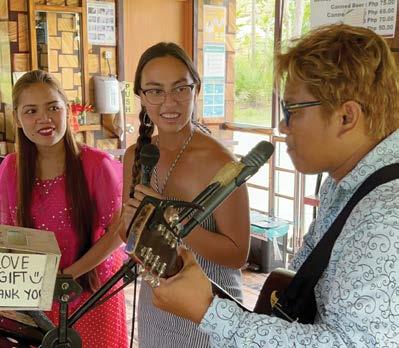
And then her students will get to work in the kitchen (and classroom), producing a cookbook to share broadly with families in Pearl City that incorporates Pacific dishes. “My goal is to foster pride in multilingualism,” she said, “and help students own their languages with confidence.”
LeAndre Browne, a doctoral student in education at Chaminade who teaches first grade in Georgia, wishes every teacher could
go on a trip like the one Washburn-Repollo organized. “I’m a lifelong learner and was extremely interested in learning another language and experiencing another culture,” she said.
“Despite being from different places, people can share similar interests bringing them closer, like a love of plants,” she said, adding that she is particularly grateful for all of the relationships she was able to forge with people the group learned from over the course of six weeks.
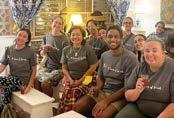
Jessica Watkins doesn’t have a classroom of her own yet but said she can’t wait to bring what she learned in the Philippines to her future lesson plans. Watkins is majoring in Elementary Education at Chaminade and said there were so many memorable moments on the trip, that it’s hard to pick a favorite.
Learning Cebuano songs and then singing them at their final presentation. Staying on Apo Island, which has no cars and limited hours of electricity service. Getting to enjoy the region’s stunning coastlines. “I now know enough of the language to have basic communication with someone,” Watkins added.
“And that could help my students feel more comfortable in my future classroom.”
CONTINUED
FROM PAGE 23
“Despite being from different places, people can share similar interests bringing them closer.”
LeAndre Browne, doctoral student
24 | CHAMINADE MAGAZINE
STUDENT FINDS MARKETING INTERNSHIPS TO SUPPORT HER PASSION FOR POLITICS
IF YOU WANT TO FOLLOW HĀLI’A CARLBOM ‘25 AROUND FOR THE DAY, YOU
BETTER PUT ON YOUR TENNIS SHOES.
SHE IS ALWAYS ON THE RUN.
In addition to a full course load as a Historical and Political Studies major (with a minor in Political Science), Carlbom is in the Chaminade Experiential Honors Program and is also honing her social media marketing and communications skills with not one but two separate internships.
Did we mention she’s only starting her sophomore year?
“I like to stay busy and get involved in the community,” said Carlbom, adding that she’s excited about voting for the first time in the upcoming election. “It’s so important to participate, to vote. I’m doing my research now—trying to read up on the candidates and attend their events. I’m doing my homework.”
Carlbom graduated from Kaiser High School and decided to follow in her sister Trinity’s footsteps to Chaminade. Carlbom

said she really wanted a university experience with small classes, where she could forge strong relationships with her professors and peers. “I really thrive on classroom discussions and I am absolutely hooked on studying history, looking into the past to understand today.”
Just how much of a history buff is she?
Carlbom said she’s not ashamed to say she’s watched “Hamilton” at least four times.
At Chaminade, Carlbom said the Experiential Honors Program has helped her pursue her academic passions. The program connected her with a mentor and has allowed her to tackle service and research projects through the university’s United Nationsaffiliated CIFAL Honolulu Center. “It’s been stressful but in a good way,” Carlbom said. “It’s all about thinking critically and really expanding your perspective.”
Carlbom is also actively building her skills with two internships.
She said she found both through Chaminade internship fairs. The first is with Mana Up Hawai'i, an initiative to support local entrepreneurs and products. The second is with the Future Collective, a youth culture creative marketing agency based in Tokyo, Japan. Carlbom has jumped into both head-first, creating marketing content for social media and helping to craft messaging across platforms.
“It’s about knowing the brand, the mission, what words to use, the design,” she said.
She added, “It’s not easy—but it’s a good challenge.”
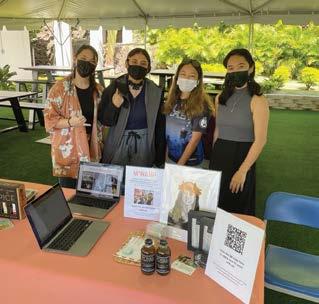
Carlbom especially likes what Mana Up Hawai'i represents and is proud to be supporting an organization that helps local and young business owners get their start. “I’m doing engagement on social media. I’m helping to promote events. I’m putting together posts. It’s really cool,” she said.
Despite her busy schedule, Carlbom is still finding time to remain active in the upcoming Hawai'i elections. “Politics really interests me, and today, social media is so important to campaigns to be able to speak directly to their audience,” she said. “I’m trying to learn as much as I can.”
And while Carlbom isn’t yet sure what her future career will be, she’s certain about one thing.
“I want to get involved,” she said, “and make a difference.”
FALL 2022 | 25
Nonprofit Business Plan Competition 2022
FROM VOCATIONAL TRAINING TO HIGHER EDUCATION MENTORSHIP AND HOMELESSNESS PREVENTION, THE SERVICES DELIVERED BY THE WINNERS OF THE 10TH ANNUAL HOGAN ENTREPRENEURIAL PROGRAM AND AMERICAN SAVINGS BANK
THEY SERVE.
But what they all share is a commitment to building a better Hawai'i for everyone.
And now they have some additional support to do just that.
Chaminade University was proud to host a special ceremony on April 27 at the Clarence T.C. Ching Conference Center to announce the winners of the annual competition—designed to support innovative proposals in the public good and celebrate the contributions that nonprofits make to the community.
In all, the Hogan Entrepreneurial Program and American Savings Bank awarded $35,000 to nine Hawai'i nonprofit organizations that participated in the competition this year. The first-place winner, Ho'ākeolapono Trades Academy and Institute, walked away with the $12,000 prize.
“We are so incredibly impressed by all of the Hawai'i nonprofits that submitted proposals for the 2022 Nonprofit Business Plan Competition. It is clear they are embracing innovation as they seek to maximize their positive impact and help our communities thrive,” said Chaminade President Lynn Babington, Ph.D.
“For 10 years, this competition has showcased the ingenuity of Hawai'i nonprofits, celebrated entrepreneurs who are driving positive change, and offered critical support to projects that have helped thousands of Hawai'i residents overcome challenges and seek out new opportunities.”
Dr. Roy Panzarella, director of the Hogan Entrepreneurial Program, said socially-motivated entrepreneurship is a powerful tool in addressing some of the biggest issues facing Hawai'i families.
 NONPROFIT BUSINESS PLAN COMPETITION ARE AS DIVERSE AS THE CLIENTS
NONPROFIT BUSINESS PLAN COMPETITION ARE AS DIVERSE AS THE CLIENTS
26 | CHAMINADE MAGAZINE
“The Nonprofit Business Plan Competition is about pushing the envelope, embracing change and rewarding Hawai'i organizations and leaders who are meeting community needs in new ways,” Panzarella said. “It is also about recognizing that we can accomplish great things when we all work together.”
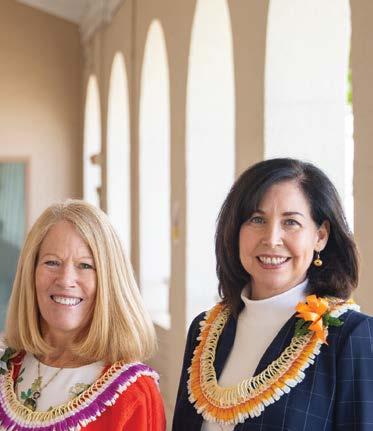
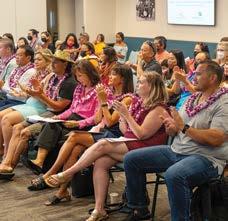
In addition to all the competition’s finalists, attendees at the event included Hogan Entrepreneurial Program leadership, Dr. Babington and American Savings Bank Senior Vice President and Director of Community Advancement Michelle Bartell.
In its application, first-place winner Ho'ākeolapono Trades Academy and Institute laid out an ambitious proposal for delivering cutting-edge vocational training across high-demand trades, with a special focus on problem-solving and lifelong learning. The nonprofit is geared toward career technical secondary students and has already partnered with several public schools to deliver its programs.
The Academy and Institue are also teaming up with the community on construction projects, involving their student participants in hands-on efforts to make renovations to classrooms and install staircases and ramps. Looking ahead, the
nonprofit is working to build a training hub on Hawai'i Island, and they want to launch a “refurbishing thrift shop” that will feature highneed household items restored by students.
“Ho'ākeolapono Trades Academy and Institute was designed to increase employment and advancement opportunities by providing participants with crucial building and construction knowledge and multidisciplinary, 21st-century trade skills,” the nonprofit wrote, in its business plan.
The second-place prize of $10,000 went to A'ALI'I Mentoring, a nonprofit that was formed to help students from underrepresented populations to navigate, persist and succeed in higher education. The organization offers one-on-one mentoring, scholarships, career development, community service activities and monthly group workshops on topics ranging from finances to communication.
“Transitioning from high school to postsecondary education remains a daunting challenge for many students,” the nonprofit said. “The support of a mentor, who can serve as a guide, as well as a listener, can be an effective intervention in addressing low persistence rates of post-secondary education.”
The third-place winner was Family Promise of Hawai'i, which provides services
to homeless and low-income families. The nonprofit received $5,000 to help support its 'Ohana Navigation Center, an innovative space seen as a hub for services, a gathering place and a resource for supplies.
The center will even serve as a shelter space to temporarily house families.
“The project’s proposed design will include a child-friendly campus where families can access various supportive services created with input from Family Promise beneficiaries, staff and community partners,” the nonprofit said. They hope to serve 290 families a year at the center.
The fourth-place award of $3,000 went to nonprofit Hui Aloha 'Āina Momona’s Ku'i'ai Accelerator project to provide quality wood to families and organizations so they can make taro pounding boards that will become heirlooms for future generations. The organization offers educational programs focused on food sustainability, local agricultural, and indigenous farming and lifestyle practices.
In past competitions, judges chose eight finalists to compete for the top prize. Because of the amount of excellent business plans submitted, nine finalists were chosen this year.
The five other nonprofit finalists also received $1,000 awards:
• Blue Ocean Warriors
• Kualoa He'eia Ecumenical Youth Project’s Living Library
• Kuilei Cliffs Restoration Project
• Ocean Alliance Project
• And Saferide Hawai'i
FALL 2022 | 27
Alumna Breaks Down Barriers in Construction Industry

THE SUMMER OF ERIN KIRIHARA’S JUNIOR YEAR AT CHAMINADE, SHE ATTENDED A JOB FAIR ORGANIZED BY THE UNIVERSITY MOSTLY—SHE JOKES— TO APPEASE HER PARENTS AND STAY BUSY. AT THE TIME, SHE WASN’T SURE OF A CAREER PATH TO PURSUE, SO SHE DECIDED TO ACCEPT AN INTERNSHIP OFFER AT A CONSTRUCTION FIRM. IT WAS AN OPPORTUNITY THAT WOULD CHANGE HER LIFE.
Rider Levett Bucknall had global backing but only eight people in its Honolulu office, Kirihara said. Today, the firm has about 55 employees across the Hawaiian Islands and is behind several iconic projects, including the luxury Park Lane Ala Moana on O‘ahu.
The residential development is attached to Ala Moana Center.
“Now that was an amazing project,” said Kirihara, who managed it on behalf of the developer.
The mother of two young children said she’s thankful to her family for their support and to her employer for providing her with the chance to advance her career in a traditionally male-dominated field. Her own success has also inspired her to encourage girls and young women to pursue opportunities in construction. She said the field offers a diversity of jobs for all talents.
“Women just rock. We’re meant for project management,” Kirihara said. “We’re great communicators.”
That’s exactly what Kirihara told a group of Girl Scouts in 2017 when she was named a Woman of Distinction by the organization and got the chance to give young girls a glimpse at what she does. “I walked them through a day in my life and they were like, ‘Wow. This is what you do? This is so cool.’ It opened their eyes to the possibilities they might find in this industry,” she said.
Kirihara said that back at Chaminade, she opted for Business Administration because she thought business was the most universal language. She learned the basics— like accounting and marketing—while also discovering a passion for community involvement and corporate responsibility.
“Everything can relate to business, including doing things that are right and ethical,” she said.
“I always thought I’d be really good at management, but I knew nothing about this field,” she said.
That summer spent at the global construction and management consultancy firm Rider Levett Bucknall (RLB) turned into an impressive career. Eighteen years and many promotions later, Kirihara is now executive vice president of the company’s North American practice and a member of the Board of Directors.
Kirihara, who graduated from Chaminade in 2006 with a degree in Business Administration, said her career trajectory is proof of her motto: “One opportunity used wisely can change your life dramatically.”
Sometimes, she added, that means making your own opportunities.
“And you’ve got to be ready to put in the hard work,” she said.
Kirihara graduated from Maryknoll School in Honolulu and chose Chaminade University because she wanted a student-centered and individualized college experience. “I think I would have gotten swallowed alive if I went to a larger school,” she said. “Chaminade was more like a family and felt right.”
The best part, Kirihara added, was building strong relationships with professors.
“They knew you and you got to know them,” she said.
When she landed that summer internship,
Kirihara added she’s proud to volunteer her time with several Hawai'i organizations. She sits on the board of directors for HUGS (Help Understandings & Group Support), an organization that helps families with seriously ill children. She is also on the executive board for Child and Family Service, which offers programs for at-risk youth, domestic violence emergencies services, elder care and more.
“We have an obligation to make Hawai'i a better place to live,” she said.
Her advice to young people just getting started out in the business world, including construction and project development, is to embrace flexibility and remain hungry for learning. “Turn that first opportunity into whatever you want to make of it, do what you have to do,” she said.
“Hard work, commitment, determination— they’ll help you excel in any career.”
28 | CHAMINADE MAGAZINE
BUSINESS STUDENTS TAKE SECOND IN NATIONAL BUSINESS CASE COMPETITION
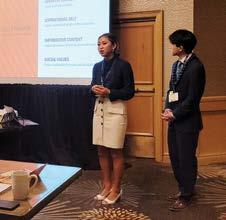
That was exactly the real-world challenge that participants of this year’s International Accreditation Council for Business Education (IACBE) Business Case Competition tackled, putting together an in-person presentation that included a robust marketing plan, business analytics, and an overall strategy for delivery—and all in less than a month.
A team of Chaminade students from the School of Business and Communication was up to the challenge. And after a lot of research and hours of planning, they traveled to the competition in Costa Mesa, California, to make their pitch. The result? A second-place win and some excellent experience.
“Our team came up with a great business strategy,” said Chaminade senior Tyrone Rixie, after the awards were announced. “It included big improvements to their app, website and an art contest. The enhancements were all about making the company more modern and digital-friendly.”
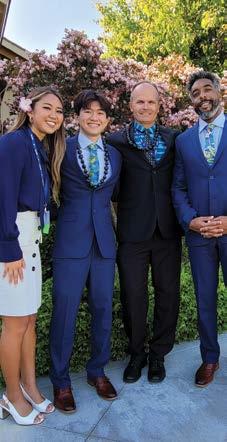
Chaminade junior Peyton Oshiro, who was also on the team, liked that the competition was reality-based. The business strategy was for Donatos Pizza, which serves customers across 400 locations in 30 states. Oshiro said developing a plan for an actual company made the competition all the more difficult.
“When we arrived, we were a little nervous,” Oshiro said.“Overall, we really came together. It was a great experience and I think we really killed it.”
Juniors Michael Rose and Ashley Yoshikawa were also on the team, which received support from lead faculty mentor Richard Kido, an associate professor of Accounting, and two team advisors: Wera PanowLoui, who teaches Marketing, and Dr. Eddie Merc, an assistant professor in Business Analytics.
For their business presentation, the Chaminade team conducted a survey of more than 100 Gen Z students, polling them on what social media platforms they prefer and their habits online. At the core of their strategy was reimagining the brand to include a cutting-edge online experience that also highlighted the company’s family foundation, given Gen Z's values and social awareness.

They also pitched a strong Instagram presence designed to bolster engagement.
The judges praised the students for their professionalism, the strength of their presentation and for weaving in innovative strategies to attract younger customers. One of the judges thought the Chaminade team put together the best package of strategies for a Gen Z profile.
Faculty mentors also said the judges appreciated the poise and confidence the Silversword team demonstrated during a question-andanswer session. The takeaway: it was clear they were prepared.
Yoshikawa, the junior, said that was particularly positive feedback.
“We did a lot of work. There was a definite lack of sleep and lots of late nights of preparation,” Yoshikawa said. “To be able to present our work to professionals, it was a really great experience.”
FALL 2022 | 29
A MAJOR PIZZA BRAND WANTS TO EXPAND ITS REACH TO TARGET MORE GENERATION Z CUSTOMERS. HOW DO YOU HELP THEM DO IT?
When Kay Een ’02 was a kid, she called many places home.
Her dad was in the military and stationed around the world, from Okinawa to Greece to Hawai'i.
And with each assignment, the family would pack up, pick up and move someplace new. Een got accustomed to change, but she also found something that always stayed the same: her love of Patricia Cornwell novels. The crime author’s delicious tales of murder and mystery fascinated her.
And eventually, they would help drive her to a successful career in forensic sciences.
But first, Een said, she had some “growing up to do.”
FINDING HER PASSION
After graduating from high school, Een wasn’t quite ready to jump into college so she decided to follow in her father’s footsteps and join the military. She chose the Navy and was trained as an air traffic controller. It was fulfilling, fast-paced work, but Een was looking for new ways to grow.
So when she was stationed in Hawai'i, she decided to enroll at Chaminade University.
She initially got her associate’s degree. And then after leaving active service, she returned to Chaminade to continue her education and complete her bachelor’s degree. She majored in Forensic Sciences,

Alumna's Forensic Science Passion TAKES
HER TO NCIS
rekindling her desire to immerse herself in crime scene investigation and evidence analysis.
At Chaminade, she also found a place where she could thrive as a nontraditional student.
“I loved the connections I made with professors. There was a camaraderie I was able to develop with them,” she said. “I also really enjoyed the fact that a lot of the younger students really looked up to us older students from a life experience perspective. We could offer our shared experiences.”
But what really set Chaminade apart, Een said, was its focus on hands-on learning.
She loved every minute of mock crime scene investigations and staged witness interviews, and couldn’t get enough of the time she spent in forensic sciences labs, either. “You really got to see the work through the eyes of police officers,” she said. “It was really fascinating—and I was hooked.”
That experiential learning continued with an internship that had Een over the moon.
A CAREER AT NCIS
She got the chance to work with the Naval Criminal Investigative Service (NCIS) for two semesters, and suddenly found her dream job. “They had me doing real work. We were going to crime scenes, collecting evidence, I went to autopsies,” Een said. “I got to know that this was really for me.”
Een loved the work so much that she applied to NCIS after graduation in 2002. But about that same time, as the U.S. bolstered military actions in the Middle East, Een was activated from the Navy Reserves and deployed to Qatar. She was there for about six months as a Navy aircrew member.
After she returned to Hawai'i, she got the call she had been waiting for: NCIS wanted to interview her.
She was hired in short order for the agency, and before she had little more than a moment to take a breath, she was assigned to general crimes and conducting investigations. “It was a great first tour,” she said. “I really got to sink my teeth into understanding what the agency and my role were all about.”
Een’s next assignment with NCIS was in Okinawa, a place where she’d lived as a kid.
She is also half-Japanese and has family on her mother’s side in mainland Japan.
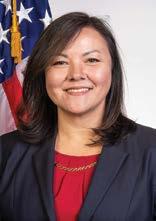
Een was assigned to the family and sexual violence unit and spent three years in Okinawa.
While there, she met her future husband, a Marine. They now have two children—10year-old Kenji and 7-year-old Cora. And from Okinawa, the couple was able to co-locate their careers to new locales. They’ve moved five times so far, including to Washington, D.C., and back to Okinawa.
Along the way, Een also received several promotions.
30 | CHAMINADE MAGAZINE
INCLUSION AND DIVERSITY IN NCIS
“That was the most amazing thing about NCIS. I didn’t have to choose between being a mom and promoting or progressing in the agency. At the end of the day, I was presented with the right opportunities and was able to progress in my military career. That’s so important,” she said.
Een now serves as the chief diversity and inclusion officer for NCIS, a role that has kept her passionate about her career and agency. She said her focus is on making NCIS the strongest it can be, and attracting and retaining the best talent. “If you don’t have equity and you don’t have inclusion, you don’t have diversity,” she said. “We need to use this canvas of people we have to the best of their abilities.”
As she marks 18 years with NCIS, Een says it hasn’t all been roses.
About 10 years into her career with the agency, with her husband deployed, Een said she almost left when she felt as if she was being asked to choose between being a mom and being an agent. But a candid conversation with her superiors allowed her to stick with it—and she’s grateful she did.

Een added she doesn’t want that experience to happen to others.
“I was fortunate that the agency picked me up and changed my trajectory,” she said. “But I really think that shouldn’t happen to anybody else. It shouldn’t be luck or a chance to determine whether or not I stayed with this agency. What if I hadn’t had that conversation? Where would I be today?”
And it’s that experience that got her interested in equity in the first place.
Een started serving as a member of the NCIS director’s Committee for Diversity and Inclusion in 2014. And when her current role opened up, she immediately put her name in the hat. “This is what I want to do because I genuinely believe that our organization is wonderful and we do really good things,” she said. “Our director believes in cultural diversity, and he believes in people. I want to support that.”
And if you’re wondering if Een is a fan of the “NCIS” TV series, too, the answer is yes.
The last time she was in the islands, she got to visit the “NCIS: Hawai'i” set and “totally fangirled.”
She’s also excited she might have more opportunities to visit. Sixteen years after leaving, Een will be moving back to Hawai'i with her family and continuing in her current role with NCIS remotely. “It’s something that we’ve always said, that Hawai'i was where we’d like to go someday,” Een said. “It has always been a touchtone, and now it’s happening. We’re thrilled.”
Ethan West
Share your exciting news with us! Send us details on your new job, promotion or retirement; recent marriage, new baby, or graduation; or any type of milestones. We would like to celebrate with you and share your great news on social media or in the next Chaminade Magazine.
ALUMNI CLASS NOTES
Correction
Stay Connected @cuhalumni @chaminade-university-alumni alumni@chaminade.edu chaminade.edu/alumni
Ethan West married Malia, his wife, in September 2021 at Kahumana Organic Farms in the Lualualei Valley on O’ahu.
ALUMNI CLASS NOTES
SUBMIT YOUR CLASS NOTE FALL 2022 | 31
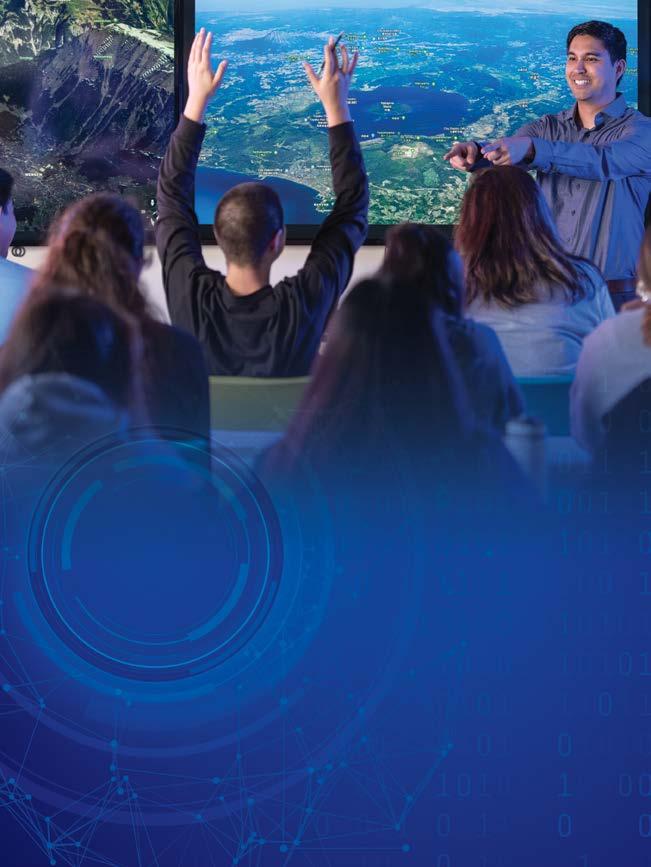
DATA REVOLUTION HARNESSING THE THROUGH A $10 MILLION GRANT DR. RYLAN CHONG, DIRECTOR OF CHAMINADE’S DATA SCIENCE PROGRAM, CALLS IT NOTHING LESS THAN HISTORIC. IN EARLY AUGUST, THE NATIONAL SCIENCE FOUNDATION (NSF) INCLUDES ALLIANCE INITIATIVE SELECTED CHAMINADE UNIVERSITY TO LEAD A GROUNDBREAKING $10 MILLION GRANT PROJECT AIMED AT CREATING NEW OPPORTUNITIES IN STEM AND DATA SCIENCE CAREERS FOR HISTORICALLY UNDERREPRESENTED POPULATIONS ACROSS HAWAI'I AND THE PACIFIC REGION.
The grant announcement, Chong said, is one of those moments that educators will look back on in a decade or so and recognize as a turning point—the beginning of new initiatives that opened doors for students, the institutions that serve them, and nonprofit and business communities in the region.
“This is about leveling up, addressing capacity in the workforce and making sure our low-income and underrepresented students have an opportunity to bring their perspectives to data science,” said Chong, adding that welcoming diverse populations into data science will ensure their voices are heard.
“You can apply data science to every field— education, healthcare and mental health, environment science and climate change and criminal justice,” he said. “It’s not just about crunching numbers, but ensuring the numbers reflect different viewpoints and getting those numbers into the right hands."
That’s why the Data Science program at Chaminade doesn’t just want to prepare students for competitive careers at the Googles and Amazons of the world. “We also want to find opportunities for students working in grassroots and community organizations, being able to contribute to projects they’re interested in while making a difference to the places where they live,” Chong said.
The competitive NSF grant is one of the largest Chaminade has ever received, and reflects the strong data science work and foundational programs already in place at the University.
With the transformative funding, Chaminade’s United Nations-affiliated CIFAL Honolulu Center will spearhead the launch of the university’s new Alliance Supporting Pacific Impact through Computational Excellence (ALLSPICE) with a consortium of partners, putting a strong emphasis on leadership for sustainable development, and efforts aimed at tackling the growing impacts of climate change.
“Chaminade University is really quite honored to lead this important initiative charged with empowering STEM leaders for tomorrow from across Hawai'i and the Pacific, equipping them with the cutting-edge tools they need to drive sustainable development projects,” said President Dr. Lynn Babington.
“This grant is part of a collective and exciting effort to meet a pivotal moment in our history by expanding opportunities to a new generation of change-makers," she said. "Our mission of service is foundational to everything we do at Chaminade, and so we are proud to drive a culturally informed initiative ultimately designed to help build healthier, more resilient and socially just communities.”
The first ALL-SPICE programming and opportunities launched in the Fall.
Dr. Helen Turner, research director of the Chaminade United Nations CIFAL Honolulu Center and a professor of Biology, is principal investigator for ALL-SPICE along with Chong. She said the funding will focus on three central efforts: bolstering training and educating, conducting data science research on sustainable development projects and building capacity (including infrastructure) for data analytics in Hawai'i and the Pacific.
“This work takes a village,” said Turner, adding the grant was the result of years of collaboration between Chaminade and other institutions to step up programming and underscore the importance of data science to the community. The Chaminade-led consortium includes the University of Hawai'i Data Science Institute, East-West Center and the Texas Advanced Computing Center (TACC).
“The National Science Foundation identified the power of data analytics for education, research and industry. They use this phrase ‘harnessing the data revolution’ because right now we are all swimming in an ocean of data," Turner said. "We can either drown as individuals, communities and society or we can swim and surf that wave— take data and turn it into wisdom, knowledge and action-based plans.”
Turner said that’s exactly what the Data Science program at Chaminade is focused on.

And the grant will exponentially increase that work, expanding opportunities to more students, community leaders and institutions so they can use data for the greater good. “Data and social justice go hand and hand. To me, it’s a very obvious and beautiful linkage,” Turner said.
For example, she noted that health inequities are fundamentally a data problem—failing to get the right resources to the right people or not fully understanding the root causes for gaps in care. Environmental problems, economic development, educational gaps can be approached similarly.
“Because a big piece of this is meeting the needs of the community,” Turner added, “no university in the United States can keep up with the pace of demand for data scientists. We want our students to succeed, but we also don’t want our own organizations in Hawai'i to be left behind.”
That’s why the grant will, in part, fund research or hands-on internships for students. Already, Chaminade students in data science are working on a plethora of important projects— looking at everything from maternal mortality in Pacific populations to recidivism in Hawai'i.
“This is about leveling up, addressing capacity in the workforce and making sure our ... students have an opportunity to bring their perspectives to data science.”
FALL 2022 | 33
Rylan Chong, Ph.D. Data Science Program Director
“If you ask what is a data scientist, the answer is everything,” Turner said. “With data science, students undoubtedly can follow their personal passions and make a positive impact. This is ultimately a vehicle for students’ passions to change the world. It’s also about democratizing our relationship with data.”
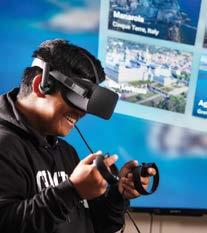


CIFAL Honolulu Executive Director Dr. Gail Grabowsky said data visualization and interpretation are a central focus of the grant’s programming. That’s because it’s not enough to analyze the data. Helping the community (especially non-data scientists) understand what the data says is just as important.
“We think data alone will change the world and it won’t,” said Grabowsky, who is also dean of the School of Natural Sciences and Mathematics at Chaminade. “What will change the world is many people working together on shared goals, using data along the way to inform policy and guide next steps.”
She added that CIFAL Honolulu envisions the Pacific Ocean as a “connector,” helping to spur conversations around both modern approaches, and traditional knowledge and practices. Indigenous ways of knowing could also bring about new perspectives and questions.
Dr. Lance Askildson, Chaminade provost, called the grant and its potential impact “incredibly significant.” He added, “This is really about creating a network of institutions across the Pacific, of which Chaminade is the lead, to provide education, training and research.”
He said a key part of the funding is working with community stakeholders to help them tell their own community stories with data. “Particularly here in the West, there is a tremendous amount of data being collected on us at all times of the day,” he said. “Being in control of your data is just like being in control of your Facebook profile—it’s a chance to tell a story with greater integrity that prioritizes your needs.”
ALL-SPICE co-Principal Investigator Dr. Kelly Gaither, the director of health analytics at TACC and a professor of Maternal Health at the Dell Medical School at the University of Texas at Austin, first started hearing about Chaminade’s work in data science in 2005 as part of a grant review committee.
What struck her the most, she said, is there was no tension between the pursuit of data science and traditional Hawaiian and Pacific knowledge and ways of knowing. “Chaminade was really trying to chop down any notion that Hawaiian science is not science,” she said. “This is the true definition of capacity building. Chaminade is really leading this, one community stakeholder and one student at a time.”
Gaither added she’s especially excited about the workforce opportunities the grant has to offer.
“We can dream big, peacefully coexist and all move forward,” she said. “That’s what is possible.”
CONTINUED
FROM PAGE 33
“What will change the world is many people working together on shared goals, using data along the way to inform policy and guide next steps.”
Gail Grabowsky, Ph.D. CIFAL Honolulu Executive Director
34 | CHAMINADE MAGAZINE
Chaminade Hosts Pacific Region Data Science Challenge

Dr. Rylan Chong, director of the program, said about 20 students from across the Pacific Region—including Saipan and Guam— participated in the remote, weeklong event along with six undergraduate mentors.
The challenge was held in coordination with similar events scattered across the country, Chong said, and with support from Extreme Science and Engineering Discovery Environment (XSEDE) and Texas Advanced Computing Center, whose supercomputer was used by student participants.
Chong said the challenges were meant to test participants’ data analysis and interpretation skills, creativity, innovation, and ability to work under pressure.
Participants also got invaluable training and mentorship—all as part of a broader effort to help them connect real-world data to actionable solutions.
Over the course of the week, students identified a research question, pored over the relevant data, arrived at results, created data visualizations, and then presented their work.
Along the way, they also attended workshops on everything from statistics to text mining in order to hone their skills.
He said the projects students worked on included a study of COVID-19 in Hawai'i and an exploration of native birds of Haleakalā. “Each project provided data sets for participants to derive their project from,” he said. “The data sets included thousands of records, and results were used to inform researchers.”
He added that the underlying theme of the challenge was about building capacity and learning communities in the Pacific to “harness the power of technology and data to address” challenges.
Chaminade Data Science student Sarah Carroll ’24 jumped at the chance to participate in the competition to build on her skills and apply them. She focused on COVID-19 in Hawai'i, text-mining Twitter data to analyze community sentiment on the virus and the government response.
“It was very rewarding to see that I am capable of implementing what I learned,” said Carroll, adding that she was thrilled to be able to put together a project and get immediate feedback on her presentation. “This experience really boosted my confidence in working with data.”
Punohu Keahi ‘25, who is majoring in Environmental Studies, participated in hopes of learning more about how to turn big data sets into results that communities can actually use to make decisions. “My biggest reason for joining this program was to step out of my comfort zone,” Keahi said. “Getting this experience is something I will never forget.”
Keahi opted to dive into data from the Haleakalā National Bird survey.
“I love native birds and I’m interested in knowing more about the different factors that could have caused the fluctuations in the bird population,” she said. “My biggest challenge during this program was figuring out how to code and then create different scatter plot and bar graphs.”
One of the greatest thrills? Using a supercomputer for the first time.
Armando Luna, a Data Science student, said the competition was tough—but a worthwhile experience. “The biggest challenge was ensuring I would have a presentable and complete project in time,” Luna said. “However, we had fantastic mentors who helped us through the week.”
Mentors like Dairian Balai ’22, who said she wanted to volunteer because of her own positive experiences at Advanced Computing for Social Change Challenges on the mainland. She was in the 2019 ACSC cohort and said the mentors were key to ensuring the event was filled with both learning and fun.
She said many of the students participating in this year’s challenge didn’t have any experience with coding, programming or working with big data sets. That meant they needed some extra help to ensure they didn’t get overwhelmed. “The students persevered and created incredible posters,” she said.
Balai added that what she enjoyed most about being a mentor was watching students grow in the challenge. “You can tell how much confidence they gained,” she said. “I also like seeing those great ‘aha!’ moments when they’re running into issues, and then they finally make a breakthrough.”
REWARDING. DIFFICULT. INSPIRING. THOSE WERE SOME OF THE WORDS STUDENT PARTICIPANTS USED TO DESCRIBE THEIR EXPERIENCES IN THE INAUGURAL ADVANCED COMPUTING FOR SOCIAL CHANGE (ACSC) CHALLENGE IN THE PACIFIC, HOSTED EARLIER THIS SPRING BY CHAMINADE UNIVERSITY’S DATA SCIENCE, ANALYTICS AND VISUALIZATION PROGRAM.
FALL 2022 | 35
ALUMNA’S ENDOWED SCHOLARSHIP CREATES OPPORTUNITIES AND A BETTER FUTURE FOR CHAMINADE STUDENTS
“That’s because of me, too. I’m hapa,” she said.
Several of Seymour’s relatives have also contributed to the endowment fund. In addition to the scholarship, which was established in 2011, both Seymour and her mother have made estate planned giving pledges to Chaminade. For Seymour, it was an easy decision to make.
“The scholarship is essentially me. It’s about establishing an identity of oneself,” she said.
celebrate what she saw in Hawai'i—a melting pot of people, from different ethnicities, cultures and backgrounds, who collectively embrace inclusivity and acceptance.
At Chaminade, Seymour lived in the residence halls and majored in International Studies.
Almost immediately, she struck up lasting friendships.
“There was a group of four of us. We were all the same age, but because of our different paths, we were all in different years. I still have precious memories of our time together,” she said, adding that one member of the group sadly passed away in the 1990s. “These were lifelong friendships.”
After graduating from Chaminade, Seymour went to graduate school in Arizona and pursued a successful career in banking. Eventually, her work included installing operating systems at credit unions around the country. Seymour said that she established the endowed scholarship at a time when she was incredibly busy with her career. “I was traveling so much I was visiting my house,” she quipped.
“I’m not noble,” said Seymour, while chatting with Chaminade Magazine. “Don't make me sound like a saint.” The scholarship, she said, is about putting her dollars to work for a better future—and that’s in everyone’s interest. “I wanted my money to go to something that was beneficial,” Seymour said.
“I want my money to create the greatest impact.”
She also wanted to help students who don’t always qualify for aid.
That’s why the Fumiko Kanazawa Endowed Scholarship, named after Seymour’s aunt, is open to students with a grade-pointaverage of 2.5 and above. “It’s for the B- or C-average students who probably need a little more help,” she said, adding that’s the category she fell into as an undergraduate.
Preference for the scholarship is also given to those who are of mixed Japanese descent.
Seymour grew up in Southern California, and said she always wanted to come to the islands. She remembers pestering her mother relentlessly about it. And so after Seymour finished two years at a small Catholic university in Los Angeles, her mother suggested she go to Hawai'i to attend Chaminade University.
“She said go to Hawai'i and get it out of your system,” Seymour said.
She did but Hawai'i always remains in her heart.
One of the first things Seymour noticed in Hawai'i was the diversity. “Being in Hawai'i and being at Chaminade, that was the first time it felt like I was really home,” she said. “Being half-Japanese, even in California, I still dealt with prejudice. But in Hawai'i, I didn’t see that.
Nobody gave you a second look.”
She added, “It was nothing but people who looked like me.”
That’s another reason the scholarship gives preference to those of mixed Japanese descent. Seymour said she wanted to
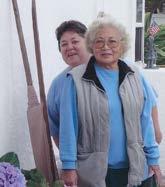
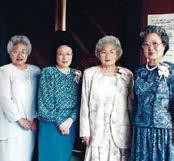
While now retired, Seymour said her calendar is still very full.
She makes time to visit Chaminade regularly to support the mission—and meet some of the students her family’s endowed scholarship has helped. Because of the pandemic, she hasn’t been able to make it to campus since 2019, but she’s looking forward to returning soon.
“I know this scholarship helps, especially those students who may not get help from elsewhere,” Seymour said. The minimum GPA requirement, she added, acknowledges that some students are juggling multiple obligations. “Holding down two jobs and trying to study, tell me when you’re going to have time to be an A-student,” she said. “This is about supporting education and opportunities.”
That is something Seymour thinks her aunt Fumiko Kanazawa, the scholarship’s namesake, would appreciate. Kanazawa was a high school history teacher in Los Angeles for many years. “This scholarship is just me. Not selfless, but just me,” she said. “It’s a commitment to help the future. That’s all.”
JAN SEYMOUR ‘76 IS PROUD OF THE ENDOWED SCHOLARSHIP SHE HELPED ESTABLISH AT CHAMINADE UNIVERSITY. YET SHE IS QUICK TO DEFLECT ANY SUGGESTION THAT SHE IS WORTHY OF PRAISE OR HIGH ESTEEM.
36 | CHAMINADE MAGAZINE
Kanazawa Sisters pictured from left: Annie Sueda, Toshe Rose, Rukie Harris and Fumiko Kanazawa
Honor Roll of Donors
If your name was omitted, mispelled or incorrectly listed, please accept our sincere apologies and notify us at gifts@chaminade.edu so that we may correct our records.
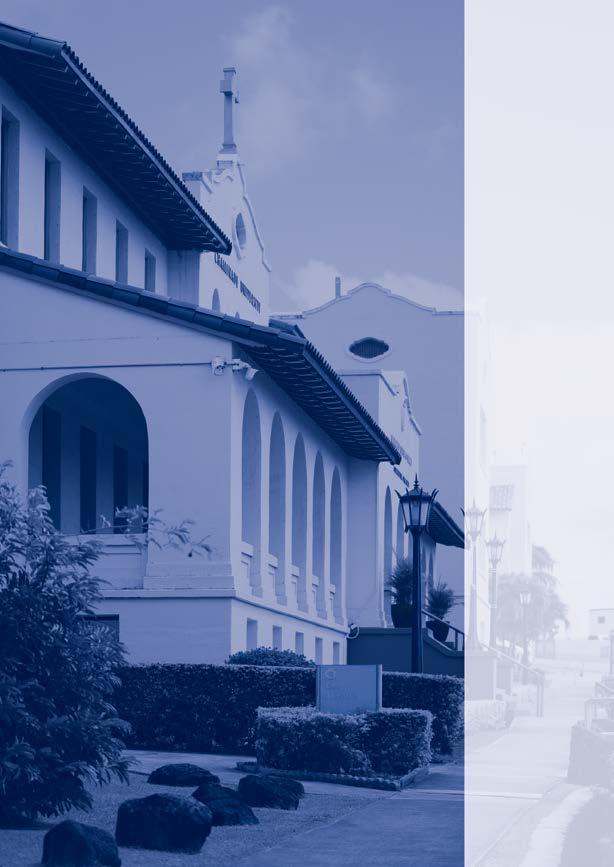
Aloha Chaminade ‘Ohana,

As we enter the winter season, all of us in the Office of Advancement feel a familiar air of thankfulness and new beginnings. So, it is with a sense of deep gratitude that I acknowledge you, our very generous alumni, parents, faculty, staff and friends for your commitment of time and treasure to our special Silversword 'Ohana. It is because of your hard-earned support that our students are able to become their very best selves. As you will read in this section, last year’s fundraising results speak volumes about your growing confidence in Chaminade, and we hope these stories of generosity will inspire you.
Advancement’s new academic year begins again with an earnest effort to address Chaminade’s long-term financial sustainability. An essential pillar of Chaminade's strategic plan, Ke Ala Mua, 2019-2024, is to continue our commitment to providing support for those students who thrive in our innovative academic community, attracting and retaining the very best faculty, and supporting relevant academic programming for the future. To achieve this, we must continue to build a robust endowment so the operating income it earns, in time, will provide the financial support to create the best university possible for our community.
This year, our dedicated staff will share with you the many ways you may contribute your time and treasure to Chaminade. We hope you will join us as we continue to enhance our Chaminade Fund and alumni connectivity, as well as strengthen our university by continuing to create endowments for academics, athletics and programming.
Finally, if it’s been a while since you’ve visited campus, we extend a heartfelt invitation to you to see for yourself the learning taking place here on Kalaepōhaku. You will see first-hand where innovation and purpose come together to educate Hawai'i’s future leaders.
Your gifts truly inspire us to support our Marianist beliefs grounded on a solid history of building community, equity, social justice and integrity of creation. Thank you for all you do for Chaminade. Should you decide to visit campus, please let us know—and welcome home.
Gary Cordova Vice President of Advancement
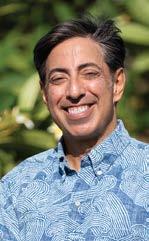
38 | CHAMINADE MAGAZINE
Mahalo,
FISCAL YEAR 2021-2022
CHAMINADE UNIVERSITY OF HONOLULU BOARD OF REGENTS
Anonymous
Violeta Arnobit and Terry Arnobit, Jr. Drs. Lynn Babington and Randall Carpenter
Ruth Ann Becker
Gae Bergquist-Trommald Carolyn Berry Wilson and David Wilson
Jerry Correa, Jr. and Mari-Jo Correa
Dr. Keiki-Pua Dancil
Ismael Eustaquio, Jr. ’88 and Anne Eustaquio ’89, MBA ’92
The Late Daniel ’81 Goo and Judy Goo Rodney Harano, MBA ’84
CHAMINADE UNIVERSITY OF
Arnold Baptiste, Jr. and Josefina Baptiste
Rick Blangiardi and Karen Chang
John and Mary Lou Brogan
Margery Bronster
Sai Cheong ’76, MBA ’78 and Mei Tak Chui
William and Judith Garrett
Dr. Christine Gayagas and Lt. Col. Douglas Tostrud, Ret. Robert and Lori Harrison
Warren and Gail Haruki
The Late Edward Hogan Gary and Nadine Hogan
Meli James
Dr. Estelle Kelley
Karen and Greg Knudsen Bennette Misalucha
Lance Mizumoto, MBA ’92 and Ayumi Mizumoto Kumaki
Lydia Park Luis and Victor Luis Alison Tanaka, MBA ’15 Dr. Lawrence Tseu
Terrence Walsh, Jr. ’93 Jeannine and Francis Wiercinski
BOARD OF GOVERNORS
Matthew ’89 and Kelli Howard
Michael Kerr
Anton and Julie Krucky
Lung-Nien ’88 and Audrey Lee Dr. Blaine Lesnik
Dawn MacNaughton, MBA ’93 Joseph and Celeste Melehan Dr. Kenneth and Lisa Moritsugu Donald and Mona Rodrigues Richard and Catherine Tanaka Vaughn Vasconcellos and Suzie Martin Albert and Maureen Wong
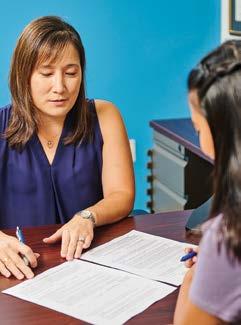
CHAMINADE UNIVERSITY OF HONOLULU FACULTY AND STAFF
Anonymous ( 8 )
Elijah Abramo '21 Dr. Donna Agan Lauren Alejo
The Late Dr. Joseph Allen and Rose-Anne Allen
Andrew Ancheta II '21 Yohko and Eddie Aquino
Tai Arakawa
Drs. Lance and Virginie Askildson Dr. Mary Atuu
Lori Ann Aukai-Paia
Sherry Ann Bagoyo ’06, MBA ’08
Dr. Frank Bailey ’94
The Late Marlene ’72, ’88 and J.R. Baker
Myra and Robert Baliares
Damien Barr
Ronald Becker
Bonnie Bedoya
Donna Bernhard
Dr. Clifford Bieberly
Dr. Richard Bordner and Nancy Tsui ’94
Eric and Dr. Leigh Bovaird Dr. Mark Brasher Dr. Maria and Alexander Brownlow Dr. Thomas Buning Dr. Kathleen Burger
Mario Callejas

Timothy Carney Dr. David and Charlotte Carter
Jeremiah Carter Dr. Lilia and Alfred Castle Dr. Eurina Cha Dr. Hans Chun Dr. Kathryn Chun Derek Chung
Dr. David and Valerie Coleman Dr. Edna Colon ’92
Denise Cooper Hilary Corcoran
Gary Cordova Makana Craig Jennifer Creech Elsie Crowninshield
HONOLULU
HONOR ROLL OF DONORS | 39
Dr. Asoke Datta, MS '05
Dr. Janet Davidson
Christine Denton
Drs. Michael and Sheryl, MEd ’11 Dohm
Timothy and Dior-Ashton '17 Donner
Olivia Easterling
Drs. Cheryl Edelson and Stanley Orr Jeela Faria
Maimoa Fineisaloi ’07
Dr. Dale and Susan Fryxell
Lisa Furuta
Thomas and Hannah Galli
Lloree Gamiao
Dr. Guanlin Gao
Dr. Gail Grabowsky
Joseph Granado
Del Green
Denise Hackman
Lynn Haff
Dr. Rhoberta Haley
Abby Halston, MS '05
Jarresa Kiyoko Harris '18
Bradford Harrison
Kevin Hashiro
Steven Hee ’80
James Heller Sutton
Jill Higashi
Tammy and Clarence Hohu
Rui Jiang and Xue Huang
Kari Inda
Stacey Ishii, MBA '20

Venus Ituralde '01, '09 Dr. Darren ’98 and Reyna Iwamoto
Bro. Thomas Jalbert, SM ’71
Allison and Craig Jerome
Adam Joseph
Aulani ’93, MBA ’96 and Kalei Kaanoi
Kahala Kabalis Hoke ’05, MS ’07 and David Hoke
Krystal Kakimoto
Kolby Kanetake
Adam Keener
Richard Kido
Jensen Kim
Ann ’01, MBA ’06, MEd ’12 and Richard Kishi
Brandon Koskie
Marcia Kurahara
Linda Lau
Zhanna Lawhorn
Sharon and Henry LePage
Choong ’09 and Chi-Ching Lim
Jeannie ’05, MBA ’07 and Lambert Lum
Wilette Lum ’92
Scott Lund
Dr. Edna Magpantay-Monroe and Michael Monroe
Dr. Bryan Man
Danielle Masuda
Dr. Christopher McNally and Pauline Ping Bai
Dr. Glenn Medeiros
Arial ’12, MS ’16 and Marvin ’11, MBA ’17 Mendoza
Harry ’67 and Ginger ’08 Miller
Dana Monday Willis Moore
Dr. Arthur and Waltraut Mori
Dr. Bryan Moseley
Dr. Travis Mukina
Dr. Chrystie Naeole
Dr. Jennifer Nafarrete
Joanne Nakano
Hieu Nguyen, MEd ’09, MBA ’14
Maxine Nihei
Claire Nishiguchi
Amber Noguchi
Devin Oishi
Bro. Allen Pacquing, SM
Wera Panow-Loui, MBA ’14
Dr. Roy Panzarella and Jody Ballard
Dr. Elizabeth, MEd ’04 and Peter Park
Christopher Patrinos and Pamela Silva-Patrinos
Dr. Katelynn Perrault
Dr. Lianne Philhower
Charisse Pudiquet
Dr. Dustyn Ragasa ’07
Dr. William Rhey
Andre "Pono" Riddle ’18, MEd ’22
Crystal Roberts
Dr. Julieta Rosado
Dr. Katrina Roseler
Dr. Guadalupe Ruiz-Jones '09 and David Hernandez
Tasha Ryan
Nicole Sagapolutele '19, MEd ’22
Dr. Francis Sakai-Kawada
Cassandra Sakamoto ’04, MS ’08
Evelyn and Oscar Sanqui Jackeline Sanqui
Dr. Robert Santee
Drs. Sean and LaVache ’94, MEd ’01 Scanlan
Dr. Scott Schroeder and Koreen Nakahodo
The Late Jeff Scofield
Aliman and Mirnah Sears
Richard Sevilla
Devon Seward Howland
Caroline Shafer
Lori Shimoda
Kendra Sia
Malo Sipelii
Dr. Pamela Smith
Fr. Martin Solma, S.M.
Dr. John and Laura Steelquist
Dr. Peter Steiger, MBA '13
Dr. Jeffrey Stern
Kristina Stone, MA ’00
Shawn Sueoka, MEd ’22
Junghwa Suh
Jules Sukhabut
Maritel Suniga
Ren Tachino
Colby Takeda
Amy Takiguchi ’02, ’06
Anela Tamashiro Dr. Joy Tanji
Wayne and Corinne Tanna
Lynette Teruya
Joshua Thinsew ’12
Russell Thoulag '09 and Lydia Villoria-Thoulag
Jennifer Tolentino ’18
Lindsey Tolentino '15
Dr. Henry and Jean Trapido-Rosenthal
Dr. Tracy Trevorrow and Lois Yamauchi
Lisa Trumbull
Julieann Tupuola ’16, MEd ’19
Dr. Helen Turner
Kurtis Van Lue
Mariah Villanueva '14
Dr. Eva Washburn-Repollo and Curtis Washburn
Deacon Michael MPT ’14 and Cecelia MPT ’14 Weaver
Dr. Michael Weichhaus
Daniel Weiss
Edna ’06 and Peter Wilson
Deneen Wong, MS ’13, MBA ’16
Sr. Malia Wong, OP
Dr. Claire Wright
Dr. Justin Wyble
Scott Wylie
Kent and Vanessa Yamaguchi
Cheryl Yamamoto
Dr. Mitch Yamasaki
Diane Yang
Jodi Yoshida
Kalena Yoshida
Renee Yuen
40 | CHAMINADE MAGAZINE
FOUNDATIONS, ORGANIZATIONS AND BUSINESSES
Anonymous (2)
Alaka'ina Foundation
Albert T. and Wallace T. Teruya Foundation
Alexander and Baldwin
Aloha Lending Services
Aloha State Volleyball Club
Antone and Edene Vidinha Charitable Trust
Armed Forces Communications and Electronics Association Hawaii
The Arthur and Mae Orvis Foundation, Inc.
Atherton Family Foundation
Barnes and Noble College Booksellers, LLC
The Camille and Henry Dreyfus Foundation
Chaminade University Educational Foundation
Chris and Melissa Ching Benjamin Fund
Chung Kun Ai Foundation
Diamond Head Seafood Wholesale, Inc.
The Edward and Peggy Eu Foundation
Enterprise Holdings Foundation
First Hawaiian Bank
First Hawaiian Bank Foundation
First Insurance Company of Hawaii Charitable Foundation
First Insurance Company of Hawaii, LTD
Frederic Duclos Barstow Foundation for American Samoans
GBSciences, Inc.
Goodenow Associates Investigations LLC
Hawai'i ETA Chapter of Alpha Delta Kappa
Hawaii Gifted Association Hawaii Law Enforcement Association
Hawai'i Pacific Health Hawaiian Electric Industries Charitable Foundation
HawaiiUSA Federal Credit Union
HI Intensity Volleyball Club
Ho'ea Foundation
Hogan Family Foundation
Honolulu Galaxy Futbol Club
Howard Hughes Medical Institute
IQ PR Inc
J. Watumull Fund
Kemper Sports Management Kosasa Foundation
L.Q. Pang Foundation
Lesnik Charitable Foundation Lin and Ella Wong Foundation
Mamoru and Aiko Takitani Foundation
The Marianist Province of the United States
Maurice and Joanna Sullivan Family Foundation
McInerny Foundation
Mildred Towle Scholarship Trust Network Enterprises, Inc. OCCPA LLC
Pepsi Beverages Company Sacred Hearts Academy
The Samuel N. and Mary Castle Foundation
Sidney Stern Memorial Trust
Sisters of the Sacred Hearts
St. Francis Healthcare System of Hawaii
Teravault, Inc.
United States Catholic Mission Association, Inc. William H. Hannon Foundation
Anonymous (13 )
Efren Adalem ’82
Benjamin and Nida Agoo Roselee Aguigui ’18
Steven Ai
Ohulani Aiona Battisto, MBA ’08
Bro. Brandon Alana, SM ’04
Steven MBA ’89 and Nancy Albanese
Marc Alexander
The Late Jeanne A. Anderson
Nathan ’81 Anderson, Sr. and Louise Anderson
Russell Anderson ’75
Jerome ’63 and Gladys Andrade James and Tina ’05, MPT ’14 Andrade
David and Lenny Andrew
Anita Andrews de Sanchez ’78
Francis Aona
Marianne Au
Cassandra Bae ’08
Dr. Corinna Balderramos
Robinson, MS ’01
Dwight ’67 and Wilhelmina Bartolome
Gary Batungbacal
Patric ’73 and Pauline Baumgartner
Robert and Marsha Beard
Damon Lee ’80 and Diane Bell
Sharese Bidot ’90
Glen Birdsall ’74
Paul Bishop ’70
Donald and Connie Bohannon William ’86 and Teresa Bossany James Bostick, MBA ’86
Rendell K. Bourg
William and Kathleen Bow Jason Bramel, MBA '06
General David Bramlett, Ret. and Dr. Nora Bramlett
Minnie Brazell ’79
Tommianne Brockert
William and Jennifer ’94 Brown William '66 and Anne Brye
Harold and Amy Bugado
Joseph ’82, ’97 and Laure Burke Thom E. Burkhardt, Jr. and Joan Burkhardt
Patrick ’87 and Katrina Butler
David Butterworth, Jr. ’80
Thomas ’68 and Patricia Cabrinha MAJ Sario ’72 and Renate Caravalho
John ’88 and Kumiko Carlin
William Chamberlin
Elton Chambers, Jr. ’76
Gloria Chang Walter Chang Claire Cheeley
Joyce Chinen
Philip and Gerry Ching Richard ’69 and Lynette Ching
Jack ’84 and Elizabeth Chinn
Michael and Barbara Chisholm Sherilyn Cho, MS ’15 Keith and Peggy Chock Glenn Chong ’75
Barry and Louise ’71 Christian Bradley Chun and Rachael Wong Dr. Michael and Bina Chun Myrna Chun-Hoon Clinton and Suzanne Churchill Michelle Cisneros '19 Drs. Joseph ’84 and Yoshimi ’85 Clark
Thelma Clark Dennis '78 and Noreen Clement William Cobb, Jr. and Barbara Cobb ’84
Brandon and Antonia '05 Coffelt M. Loretta Cofield ’75 William ’73 and Phyllis Cook Michele Cooke
Regina Coopat, MBA ’84
Louisa Cooper
Drs. Michael ’79 and Sally Coovert Patrick Corsi
James ’90 and Susan Coughlin John Crank ’96 and Un Mei Pan Wayne and Pamela ’80 Crenwelge Jeffrey ’70 and Peggy Cribbs, Sr. Dr. Michaela Culkin ’98 John Culmer ’73 Michael and Judy Cummings
Dr. James Curry
Jennifer Dahl
Shannon Davenport
Dr. Lance ’78 and Jean Davis Jan De Luz ’81
Sadami '78 and Emily Deai Timothy, MBA ’93 and Christina Deane
Cipriano ’83 and Tessa Deluna Rev. Rodney DeMartini ’69
Timothy Ngau and Terryleen Dement-Ngau ’72 Dr. Ronald ’67 and Michele Dempsey
William and Lovey-Ann ’76 DeRego
The Late Gerald ’62 Devlin and Roseyn Devlin
Frank and Frances, MA ’04 Doyle Lincoln ’69, MEd ’75 and Mary Jane Drake
Richard ’88 and Sandi Duncan Russell ’75 and Christine Dung
William Raymond Dunkel ’82
Lee and Jan ’84 Dunlap
Henry Dziekan, Jr. and Cathleen Dziekan ’73
Marie Early, BGS ’80
Terry and Julie Ebato
Robert Eisiminger
T. Tyler, MBA ’78 and Gwen Ellison
HONOR ROLL OF DONORS | 41
CHAMINADE UNIVERSITY OF HONOLULU ALUMNI, PARENTS AND FRIENDS
John ’70 and Mary Epperson
Richard ’84, MBA ’85 and Nancy Erickson
Scott ’87 and Diane Erickson
Aileen Esmeralda, MS ’10
Travis Estanique
Dr. Amado Gabriel, MS ’86 and Josephine Esteban
Cleo Eubanks, MS '05, MEd '14
SSTG Phillip Everson, IV ’93
Lydell Fabin Jerry ’73 and Michal Mary Farrar
Joyce Favorite ’86
William ’68 and Karen Ferguson David Fisk
Dennis ’83 and Kathy Flaherty
John Field, Jr., MBA ’84 and Susie Field
Cynthia Flating, MBA ’89 John Fleckles
Leslie Flint
Vice Admiral Jeffrey, MBA ’85 and Katherine Fowler James and Judith ’65 Fox
Romain Fravien ’01
Eric, MBA ’94 and Lori ’01
Fujimoto
Kinsley ’67 and Sue Fujitani Clifton and Sandra ’79, ’82 Furukawa
Raymond and Martha Gallegos
Samuel Galloway '14
Jeffrey Galon '12, MS '15
Jerry Garcia, Jr. ’82 and Terry Garcia
Claire Gehrman ’89, MS ’95
Thomas Geist
Paul Goeller, Jr. '73
Harsjarif and Jennifer Goldstein
Kristina Viloria, MEd ‘18
Middle School Academic Coach, DreamHouse ‘Ewa Beach

Lisa Gomes ’99, MA ’04
Karl Gonda ’80
David Wendt and Diana Gonsalves-Wendt ’73 Henry Goodrow
Rita Gora
CAPT Michael ’77, ’80 and Mary Gordon
Wesley James '72 and Donna Graybill
Kevin ’80 and Kimberly Grondin Orby Groves, Sr. ’76 and Ruth Groves
Mark ’82 and Deirdre Guillory Perry and Linda Hachler
Edward ’77 and Janet Hagan
Ottina Haight
Julie Halpern, MS ’95
Robert Hamamoto, MBA ’88 and Dayle Sasaki-Hamamoto
David ’63 and Lorraine ’64 Hamilton
Myra Harper-Samiere
Rukie Harris
Lita Hayes ’91
Kenneth and Marissa Hilgers
William and Virginia Hinshaw Reed Hisamoto, MS '15
Judith Holloway ’76
Glenn Honda
Wendell Hosea, BGS '67
Chris Hosey
CDR Hilbert ’74 and Joan Hubble
Thomas and Gloria Huber Brian and Janinne ’91, ’92 Hulsey Howard Humphreys, Jr. and Sylvia Humphreys
Karlene Inaura ’73
Daniel and T. Nichelle ’01 Inman
Mike and Sandy Irish
Wayne ’68 and Joy Ishihara
Drs. Craig Iwamoto and Alexis Raftopoulos
Ronald Iwamoto
William '73 and Duanne Jacobi Kathy Jeffers-Volk Sandra Jhung ’63
Leonard and Sheila Johnson Rev. Kizzie Elizabeth Jones ’90 Joon Joo ’83, MBA ’84 Marko Vincent Kalaba '95 Dr. Randall Kam and Lesley Brey, MBA ’88 Andrew Kamikawa ’05, MBA ’09
Timothy Kaneshiro Clyde ’66 and Margaret Kang Albert Kanno
John Karbens
Edward ’60 and Grace ’61 Kashiwamura
MAJ Clayton ’78 and Jay Ann Kau Daniel ’07 and Heather Kava Ray Kawaguchi and The Late Katherine Kawaguchi
Robert Kay Richard and Helene ’87 Kaya James Kelly
Yoko Kessner, MS '95 Stuart ’86 and Ronell Kimura Ken Kitamura ’86 and Maria Torres-Kitamura
William Klett '72
Richard and Adeline Kline Kirk, MBA ’78 and Pamela Knight Gregg and Be-Jay ’86, MBA ’16 Kodama
Duane and Cara Kondo Corita Kong ’63
CAPT Terrence Kong ’89, MS ’03 David and Susan Kramer
Matilda Kruse ’13
Michael and Gail Kruse Brad Kusunoki, MS '08
Jadine Lau ’72
Ricky LaVaughn
Francios Lawen ’93
Edward Lee ’72
Ernest and Letah Lee Leila Lee, MEd ’05 Lorraine Lee
Aleeyah Lemons
Gregory Leong ’72
Robert and Kathy Leopoldino
John, MBA ’79 and Cheryl Lettieri
LCDR Mark, MS ’90 and Julie Lindstrom
Robert, MBA ’87 and Susan Lingo Dennis and Janice ’07 Lock Elliot Loden Leslie Loo
Michael and Cynthia Loui LTC Grady ’78 and Suzan Lovett Robert ’81 and Jill Lowe
Raymond and Deirdre Lum
Reynold Lum, MBA ’84
Alan, MBA ’81 and Carrie Ma James ’74 and Rose Mace
Donald MacGregor, Jr. Katherine MacPherson ’82
Duayne Madl
Syed Mahmud '84
James and Luella Malkin
David and Susan ’86 Maltby Dr. Edmundo’72 and Cheryle Mandac
Stephen, MBA ’78 and Donna Marcuccilli
Gustavo and Sonia Matamoros Roy and Mary Matsuda
Frank Maxwell, Jr., MBA ’88 and Lane Maxwell
Loretta Mayko
Olive Mc Ginnis
Joan McAllister-Williams ’00
Peter and Kirsten, MBA ’88
McCormick
Mary McCullough
Norma McDonald ’64
Scott and Stephanie McDonald
Bruce and Bee McEachen
William ’84 and Lana McNeely
Michael Medrano
Gary Mellor AKCM ’93
Paul Messina
Jon Miki ’67
Sidney Milburn II ’80
Frank Miller ’77
Carol Minami, MBA ’86
Michael, MBA ’88 and Joan Minnehan
“As a Chaminade alumna, I wanted to give back to the Chaminade community. I made my first gift to the Chaminade Fund and will continue my support to make a small difference in the life of a student.”
42 | CHAMINADE MAGAZINE
Linda Mistysyn Gay ’62 and Maria Miyakawa Gervin ’80 and Gayle Miyamoto
George Miyashiro
Dr. Edison Miyawaki
Robert ’86 and Michele Moesch
Harry Moleta, Sr. '77 and Lanette Moleta
Milton Sagon and Fay Molina-Sagon ’64
Richard and Patricia Montgomery Matthew Morgan, MEd '02
Ambassadors James and Lauren, MAT ’18 Moriarty
Barbara Motola-Alford
Francis ’75 and Arlene Mungavin
Christopher and Judith Munoz
Cassin Muramoto ’14
Raymond ’72 and Nora Mysliwski
Kenneth Pollet and Joan Nacino ’85
Angela Faye Navor
Joseph ’87 and Theresa Nawahine
Allan Nebrija ’08
Jill Newton, MBA ’00
Doris Ng ’67
Edgar Ng ’74
Richard Ng ’75 and Judy Thompson-Ng
Abigail Nickell, MBA '12
Dennis Niederkohr ’78
Dr. Linda Nishigaya ’69
Mark Nishioka
Ronald ’80 and Mary Njus
Robert and Anne ’60 Noguchi
Adrian Chang and Christine Ohtani-Chang ’92
Nancy Oide
CMSGT Thomas ’73 and Ann Oliver
Robert Olmos, Jr. ’80 and Lucy Olmos
Jerry and Arlene Ono Lorraine Oshiro ’84
Yoshi Honda and Susanne O'Sullivan-Honda ’98
Ernest Oversen, MS ’95
Charlene Oyama ’70
Darian Padilla '15, MBA '18 Manuel ’72 and Judy Palazzo Heathre Palige ’02

Richter Panaligan ’10
Wendell and Annette Pang Victor Panganiban '10
Thomas and Mary Parpana David Parrish ’80
Daniel Pavsek
Terry ’82 and Donna ’85 Pennington
Maureen Pescaia ’96, ’07
Thomas ’64 and Jeannette Peterson
Henry and Lorraine Pieloch Teri Pinney ’89

John Anthony Pinpin '11
Richard ’77 and Barbara Poe Ned, MBA ’81 and Susan Powers Deborah Prachaseri Michael and Janis Prinslow Michael ’80 and Darlene Puhr
Regina Racaza
Melissa Lynn Ragasa
Wendle Raping ’07
Bro. Thomas Redmond, SM ’85 William Reed, Jr., MBA ’89
Daniel and Susan Reedy Lt. Col. Elwin ’70 and Norma Reichert
Max Reiter ’71
James Render Patrick Rizer
John ’69, ’72 and Robyn ’69 Robinette
Georgia Robinson ’91 Brian and Maureen ’88 Robinson Eric Roeben ’75, MBA ’78
Diane Roedersheimer ’81 Jean Rolles, MSJBS '93 Cecelia Romero
Felipe ’64 and Dalisay Rosario James Rose '06
Carl ’70, MBA ’78 and Sandra ’72, ’82 Rossetti
CAPT Jimmie ’81 and Teresa Jean Russell
Dexter ’65 and Emily Sakai Warren and Carmelita Sakuma COL Frank ’69 and Patricia Salimbene
Ambassador Charles Salmon, Jr. Gordon Sam
Raymond and Rosemarie
San Nicolas
Melvin and Allison, MBA ’86 Sasaki
Donald ’75 and Peggy Schaum
Tony Schmidt
Dennis Schmitz '71
Lt. Col. John and Rieko Schriml William and Margaret Schulz
Raymond and Betsy ’86, ’92 Sekiya
Anthony Selvanathan '15
Jill Semmens, MEd ’13
CMSGT John ’82 and Mary Setser
Jan Seymour ’76
Michael and Cynthia ’71 Shain
Clifford Shields ’82
Walter Shimoda
Mark and Bernadette ’85, MBA ’92 Shimono
Margaret Showalter
Miles and Ruth ’64 Silberstein Russell Silva ’66
Ryan Silver Sandra Simmons
Herbert ’78 and Nanette Skipp Thomas Snee ’69
Douglass ’64 and Paulette ’80 Souza
John ’01 and Jayna Spahn, Jr. Andrew Speese, Jr. ’67
Bro. Thomas Spring, SM
David Sprouse '09, MS '17
Ulysses A. Stanley ’79
Marti Steele ’92
John Stegall '01
Derek and Donna Stewart Lavilis and Bernice Stover
Rose Sunada
Thomas Symonds, III ’02
Nancy Szymczak ’85
Donald Takaki ’68
Chaplain Lawrence Takao Elaine Takata, MBA ’06
Keith ’77 and Mardelle Tamashiro Stuart, MBA ’84 and Margaret Tanimoto
Kenneth and Barbara ’65 Tanji Manuel Tavares, Jr. ’72 and Carol Tavares
Paul and Patricia Taylor
Virginia Teller
Roy Thomas, Jr. ’74 and Soledad Thomas
Michael and Wilma Todd
Ronald ’73 and Shirley Todd
Dr. Laurie Tom Wallace and Pauline Tom Rodney and Shana, MEd ’08 Tong Richard Townsend ’65
Theresa Toyama
HONOR ROLL OF DONORS | 43
Lori Tsukamoto, MEd ’05
Georgia Tsukazaki ’88
Daniel Tucker ’79
Virginia Tuckey ’61
George Turner, Jr. ’77 and Ellen Turner
John and Celia Uekawa Arthur ’77 and Julie Ugalde Andres Uherbelau
Terence, MBA ’91 and Anna Ulaszewski Jade Unabia Roy ’67 and Joan Uyehara
Doug Venneri
SGT MAJ Thaddeus '77 and Jean Verville
Robert, MBA ’80 and Carol Vieira Allan and Christine Walker
Jerry Walker, Jr. and Donna Walker
James Walsh, Jr. and Rachanikorn Walsh
Thomas ’78 and Sandra Walther
Montira Warran ’95, MS ’99
Mary Watanabe ’60
Rev. Msgr. Terrence Watanabe ’73
Timothy Wee, Jr. and LeNora Wee ’72 John and Erin ’84 Wegznek
Bishop Quinn Weitzel
Dr. Ted, MBA ’91 and Catherine Wells
Thomas and Magdalen ’65 Wenska Rev. Arthur Bain White, Jr. ’76
CAPT William ’70 and Karnchana Whorton
Weston and Grace Williams Douglas ’72 and Suzanne Williamson Peter and Janice ’84 Wizinowich Ronald and Kathleen Wo CDR Ronald and Tesi Wong
William Morgan and Dr. Rosemary Wong ’67
Tracy Lynn Wong, MBA ’14
Kehaulani Yamaguchi ’06, ’09 Francis ’69 and Kathleen ’69 Yamamura
Theodore and Daisy ’85 Yamane
George Yamasaki, Jr. ’79
Theodore Yap, Jr. ’74
Linda Yeates ’97
Patrick and Sandy Yim Walter and Frances Yoshimitsu Harlin Young ’63
Donald and Teresa ’62 Young The Late Verna Young ’62
Dave Yuen, MS ’12
Gwenson MS ’83 and Helen Yuen Stephen Yuen
William Yuen
Robert ’60 and Kapiolani Yuhara Nicole Zheng
James and Arleen, MBA ’92 Zirkle
On The Hill –Connect and Create
The slopes of Kalaepōhaku have always been a second home for me during my younger days. I would slowly work my way down the street from Sacred Hearts Academy to meet my brothers at Saint Louis School. My memories of the Marianist community and its profound impact on my family are centered around service, family and a quality education.
After graduating from college, I returned home to Hawai'i to raise my family. My career led to social service organizations, as well as local independent schools where I created and led fundraising and engagement programming. Everywhere I have worked embraced formation in faith, a commitment to education, service, family spirit, as well as adaption and change. All of these characteristics are at the core of my life’s work and reflect the characteristics of a Marianist education.
As the new Director of Alumni Relations, I am excited to reach out to you in the coming months to hear about your campus memories and share all of the exciting developments at Chaminade.
If it’s been a while since you’ve walked “the hill,” I invite you to visit and to share those memories with me. I can be reached via email at alumni @ chaminade.edu or call me at (808) 973 5007.
Go Swords!
Jodi-Anne Yoshida, Director of Alumni Relations (808) 735 4763 alumni @ chaminade.edu
44 | CHAMINADE MAGAZINE
SAVE THE DATE
CONNECT WITH US cuh alumni chaminade-university-alumni
Return to campus!
We’re happy to take you on a campus tour and visit all your favorite people from the Chaminade 'ohana.
Contact us at alumni @ chaminade.edu or (808) 735-4763.
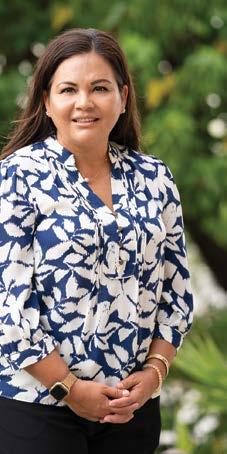
Giving Tuesday is a fundraising challenge that brings our entire Silversword community, near and far, together to support our students. If you are in the position to help, please participate by making a gift on November 29.
Don’t want to wait? Make a gift today that will count towards Giving Tuesday!
FALL 2022 | 45
CHAMINADE LAUNCHES Doctor of Marriage and Family Therapy Program
The doctoral degree received Western Association of Schools and Colleges (WASC) accreditation, in recognition of the high quality of academic preparation and rigor for participating students, said the program’s director Dr. Blendine Hawkins.
Hawkins, an assistant professor of Psychology at Chaminade and a licensed marriage and family therapist, said the doctoral degree will welcome students with diverse educational and professional backgrounds, including in psychology, counseling, social work or marriage and family therapy. Applicants must have a master’s degree in Marriage and Family Therapy (MFT) or completed coursework sufficient for MFT licensure. They also must be clinically active or be working to achieve licensure.
“We want to take their skills to the next level as they become expert clinicians, serving Hawai'i in a culturally sensitive way,” she said, adding that the degree will prepare students for leadership, supervision and consultation, teaching in higher education and for program administration.
“Hawai'i has a dearth of experts in this field,” Hawkins said. “This program is about helping the next generation of marriage and family therapy clinicians build their skills. We think with the family in mind all the time and that’s really what sets us apart. Our prime purpose is to strengthen those connections, to honor families, to look at those areas of hurt and pain, and to help people build resilience.”
The DMFT program will be delivered fully online, with both synchronous and asynchronous classes. With 10-week terms, students can complete their degree in as few as 36 months.
The degree, the only one of its kind in Hawai'i, is also practice-focused and designed for working professionals. The cohort system allows participants to make progress toward their degree as a team, Hawkins said, supporting one another and building strong relationships along the way.
As part of the degree, participants will complete a dissertation and be encouraged to select an action research project focused on hands-on learning and maximizing their
 TO HELP MEET A CRITICAL NEED FOR MENTAL HEALTH SERVICES, LEADERSHIP AND PROGRAM ADMINISTRATION IN HAWAI'I, CHAMINADE UNIVERSITY LAUNCHED A NEW DOCTOR OF MARRIAGE AND FAMILY THERAPY (DMFT) PROGRAM—THE INAUGURAL COHORT OF STUDENTS BEGAN THEIR ACADEMIC JOURNEY IN OCTOBER.
TO HELP MEET A CRITICAL NEED FOR MENTAL HEALTH SERVICES, LEADERSHIP AND PROGRAM ADMINISTRATION IN HAWAI'I, CHAMINADE UNIVERSITY LAUNCHED A NEW DOCTOR OF MARRIAGE AND FAMILY THERAPY (DMFT) PROGRAM—THE INAUGURAL COHORT OF STUDENTS BEGAN THEIR ACADEMIC JOURNEY IN OCTOBER.
46 | CHAMINADE MAGAZINE
positive impact. “Students will be able to conduct their dissertation research in their workplace or as part of a clinic experience, understanding how to better help their clients and evaluating programs,” Hawkins said.
Chaminade President Lynn Babington, Ph.D., said the doctoral degree helps to meet a strong need for marriage and family therapy clinicians operating at the highest levels of the discipline. “The Doctor of Marriage and Family Therapy is all about leadership and preparing students to take the next step in their careers so they can better advocate for families and build healthier family units, which in turn positively impacts our community,” she said.
“Service and social justice are at the foundation of this degree, aligning with our broader Marianist values at Chaminade that seek to educate the whole person and help students pursue positive change.”
Dr. Dale Fryxell, dean of the School of Education and Behavioral Sciences, added that the professors serving the program were hand-picked and are all experts in their field. “These faculty-mentors are not only well-versed in theory but in practice, bringing decades of experience to the program,” Fryxell said.
“They are perfectly suited to supporting our DMFT participants as they build on their professional identities in advanced levels of clinical intervention and also grow adept at systemic leadership, program building and consultation to practitioners, nonprofit organizations and healthcare entities.”
Hawkins said the program is designed to appeal to a wide range of students, including mid-career professionals and those who have just completed a master’s degree in Marriage and Family Therapy.
Participants, she added, will have access to a strong network of support from faculty members, program advisors and Chaminade support staff. Hawkins also said the coursework—like the dissertation—is designed to stress experiential learning, skills building and leadership development.
“They’ll have opportunities to hone their skills in real-world settings, weaving in unique challenges, complexities and nuances present in Hawai'i,” Hawkins said. “And at every turn, we will employ a socially just, informed lens to working with clients while recognizing no two families are alike.”
MAMORU AND AIKO TAKITANI FOUNDATION SUPPORT STUDENT SCHOLARSHIPS
CHAMINADE UNIVERSITY OF HONOLULU RECEIVED A $75,000 GRANT FROM THE MAMORU AND AIKO TAKITANI FOUNDATION FOR STUDENT SCHOLARSHIPS. THE GRANT WILL BE SPLIT TO FUND PHYSICAL AND BEHAVIORAL HEALTH MAJORS FOR THE 2022–2023 SCHOOL YEAR. SCHOLARSHIPS WILL RANGE FROM $1,000 TO $10,000, DEPENDING ON FINANCIAL NEED.


Learn more about our Doctor of Marriage and Family Therapy program.
The scholarships will target students entering high-value majors with a focus on physical and behavioral health professions as key to Hawai'i’s recovery and economic resilience. These majors include Chaminade’s new 20-month accelerated Bachelor of Science in Nursing program, which allows students to complete their nursing degree in five back-toback terms, and its Community and Public Health program that prepares students for such careers as community health worker, health educator and public health investigator.
The Mamoru and Aiko Takitani Foundation has provided funding for student scholarships to Chaminade University since 2014. The Foundation was established in 1993 by entrepreneurs Mamoru and Aiko Takitani, founders of Hawaiian Host, to assist the youth of Hawai'i with their goals. Since its establishment, the Foundation has donated $2.3 million in scholarships and provided educational opportunities to students in Hawai'i.
FALL 2022 | 47
Healthy and Sustainable Hawai‘i Speaker Series
A SERIES OF SPEAKERS EXPLORING EVERYTHING FROM CLIMATE CHANGE RESILIENCE TO INDIGENOUS WISDOM TO HEALTHCARE
The events were aimed at underscoring the mission of the center, an exciting partnership between Chaminade and the United Nations Institute for Training and Research (UNITAR). CIFAL Honolulu is designed to serve as a hub in Hawai'i and the Pacific Region for leadership, training and education around key sustainable development goals—convening and empowering people to maximize their positive impact.
The Healthy & Sustainable Hawai'i Speaker Series kicked off with Lt. Governor Josh Green.
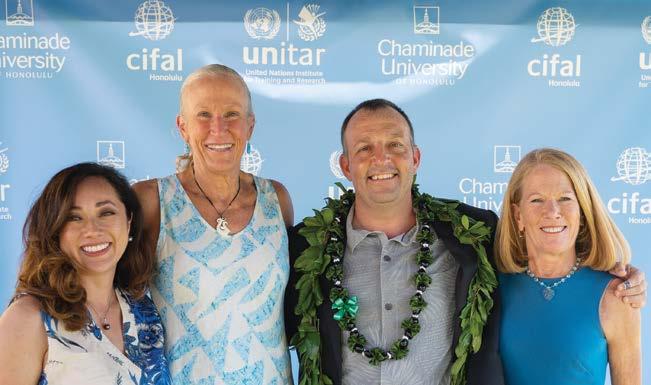
Green, a practicing physician, discussed his vision for bolstering the health and well-being of people in Hawai'i and the Pacific, encouraging attendees to consider how a plethora of social issues— drug addiction, domestic violence, homelessness, poverty—are all connected to health metrics.
“Systems are complex and they require complex thought,” said Green, adding COVID-19 has both complicated the state’s healthcare landscape and introduced new opportunities, like broadening the availability of telehealth services. “The consequences of health disparities are great. There’s no choice but to address them. What we now know is that your zip code matters more than your genetic code.”
In his speech, Green talked about how he came to the islands from Pennsylvania to serve as a rural doctor on Hawai'i Island and then decided to run for office in hopes of bringing attention to healthcare disparities he was seeing first-hand. Fast forward to 2019 and he was in the lieutenant governor’s office and having a conversation with the government of Western Samoa about a huge measles outbreak.
They asked Green, “Could you come and vaccinate our entire country?”
Green wasn’t sure how he was going to accomplish it, but he corralled resources in lightning speed. Hundreds of Hawai'i healthcare professionals volunteered to assist. Airlines donated travel. And vaccines were provided free of charge. Over just 48 hours, some 37,000 measles vaccinations were administered.
And just a few months after that ordeal, Green and his team started getting wind of a worrisome new coronavirus making people sick in China and spreading to U.S. cities. “There was a problem on the horizon, and we just witnessed what a virus could do,” Green said. “I knew we better get ready.”
Within weeks, a pandemic was declared, and the state was shut down.
Green said COVID-19 underscored the power of working together, especially in emergencies, to shepherd resources and keep people safe.
EQUITY HELPED LAUNCH THE NEW UNITED NATIONS-AFFILIATED CIFAL HONOLULU CENTRE AT CHAMINADE UNIVERSITY.
48 | CHAMINADE MAGAZINE
He said that the same approach is necessary to grapple with some of the biggest crises facing Hawai'i, many of which have significant implications on health.
Also on April 12, the CIFAL Centre hosted Life Enhancement Institute of the Pacific Founder and President Ramsay Taum and Hōkūle'a student navigator Lucy Lee ’23 for a conversation about cultural and historical connections across the Pacific that could guide the way for sustainable development.
In considering climate change resilience and sustainability, Taum told attendees we must begin by “considering the empty chair”—our ancestors, loved ones who have departed and relatives who have not yet been born, but also those we are trying to protect. “Who is it that you are accountable to?” Taum asked, adding that he writes a letter every night to the people who will become his great-great grandchildren to answer their question, “What did you do when you had the chance?”
Taum said it’s also important to understand our priorities as an island community. “When we take fertile lands that we grow food in, and grow cement in them instead, what we’ve suggested is that we’ve shifted a priority—we’re OK with shipping our food in rather than growing it,” he said.
“Imagine if we created policies on caring. Do you think the carrying capacities will follow? I think so.”
He added that it’s important to understand the difference between wisdom and knowledge, and recognize the importance of each in creating resilient, sustainable communities. “Maybe our success living on this island called Earth could be supported by talking to islanders,” Taum said.
In her address, Lee also touched on the value of place-based solutions.
A solution for one community, she pointed out, might not work for another. She added that communication and dialogue are also central ingredients in making headway on some of society’s biggest obstacles. To underscore the point, Lee recalled her first navigation experience onboard the Polynesian voyaging canoe Hōkūle'a. She and other students were charged with finding Nihoa island.
At the time, the Environmental Studies major said, Polynesian Voyaging Society President and Master Navigator Nainoa Thompson told her that he didn’t care if she found the island in the Papahānaumokuākea Marine National Monument.
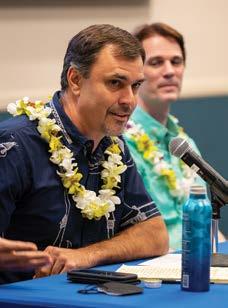
What he cared about was whether she was leading her crew. “You can be the best
navigator in the world. If no one wants to be on crew with you, you’ll be sailing solo for the rest of your life,” she said.
The final event in the speaker series, on April 18, was a panel discussion on climate resiliency and mitigation. The talk was moderated by Alexander & Baldwin CEO Chris Benjamin, and included scientists, policy leaders and others discussing the stakes for Hawai'i, the fight ahead, and how the Hawai'i Executive Collaborative is seeking to drive change for the better with its Climate Coalition.
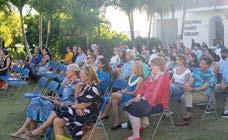
“We’re here today because our planet is in peril,” Benjamin told attendees. “Hawai'i will experience climate change particularly acutely. This can’t just be a government solution or a nonprofit solution. It’s not just about educating people. It’s about all of these things. We’re trying to connect the dots.”
Dr. Charles “Chip” Fletcher, a panelist and dean of the School of Ocean and Earth Science and Technology at the University of Hawai'i at Mānoa, said climate change is an immense problem with no easy solutions. But he’s optimistic about how Hawai'i will tackle global warming’s many challenges.
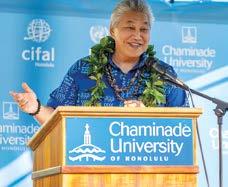
“We have the cultural and economic and social framework with which we can thrive in this century,” Fletcher said. “Our community in Hawai'i can be strongly unified. That is a community that can be prepared for the shocks and stresses of climate change. But we have a lot of work to do.”
Aimee Barnes, founder and CEO of Hua Nani Partners, said despair and doom are frequent and unfortunate themes in climate change circles. As she told attendees, however, there is an antidote: action. “The work that we’re doing really does matter. It’s going to help,” she said.
Elemental Excelerator Policy Fellow and former city Resilience Officer, Josh Stanbro, said sustainable action also adds up—especially at the local level. “When we’re talking about turning these islands into a climate resilient place, I think we have a better shot than most.”
Panelist Scott Glenn, the state’s chief energy officer, agreed, and said fighting climate change and mitigating its impacts shouldn’t be seen simply as good for the environment or for communities but should be considered the right thing to do. “For all of us, it comes down to the opportunities we have to be a good person, to be a decent human. Fighting poverty, planting a tree is about making life better.”
FALL 2022 | 49
CHAMINADE SETS NEW RECORD ON ACADEMIC ALL- PACWEST TEAMS


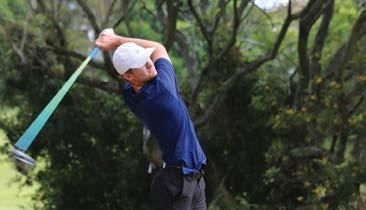


CHAMINADE UNIVERSITY ATHLETICS PLACED A RECORD 109 STUDENT-ATHLETES ON THE ACADEMIC ALL-PACIFIC WEST CONFERENCE TEAMS FOR THE 2021–2022 SEASON.
The mark broke the previous standard of 100 student-athletes that was set during the 2019–2020 season. Three Silverswords were dual-sport athletics, making this year's actual total of 112.
Women's soccer had the most individuals with 22 honorees, while softball had the highest percentage of its roster at 94 percent.

Meanwhile, women's tennis had all seven of its players named Academic All-PacWest, representing the fourth consecutive year the program had its entire roster named to the academic team.
The PacWest totaled 1,793 student-athletes from its 15 sports recognized as academic all-conference.
To be eligible for Academic All-PacWest honors, student-athletes must have a cumulative career grade-point average of 3.00 in a conference-sponsored sport, have attended a minimum of two semesters at their current institutions and competed in a minimum of one competition during the regular season.
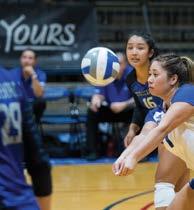
50 | CHAMINADE MAGAZINE
MEN’S BASKETBALL
Isaac Amaral-Artharee, Master of Business Administration
Michael Cahill ‘24, Business Administration
Kevin Kremer ‘23, Business Administration
Zach McIntire, Master of Business Administration
Patrick Renane ‘24, Business Administration
Joseph Smoyer, Master of Business Administration
Sawyer Storms ‘24, Business Administration
Paris Taylor ‘23, Interdisciplinary Studies
Jessiya Villa ‘25, Religious Studies
Raazhel Watkins ‘23, Interdisciplinary Studies
Kobe Young ‘24, Biochemistry

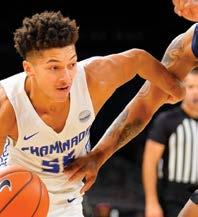
WOMEN’S BASKETBALL
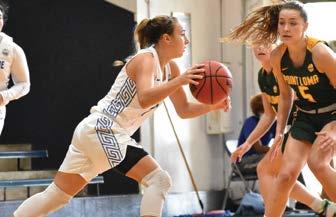
Jamia Bailey ‘22, Elementary Education
Ellyonna Bankofier ‘22, Nursing
Arianna Blowe ‘22, Psychology
Michaella Dean ‘22, Behavioral Science
Dallas Martinez ‘24
Jenna McLean ‘22, Biology
Mia Ming ‘25, Biology
Mary-Lee Mitchell ‘25, Environmental Studies
Emma Morris ‘24, Biology
Sasha Phillip ‘24, Environmental Science
Paige Relph ‘24, Biology
Jordyn Zader ‘23, Accounting
MEN’S CROSS COUNTRY
Elijah Bernardo-Flores, Master of Science in Criminal Justice Studies
Owen Daugherty ‘24, Business Administration
Conor McMahon ‘24, Environmental Science
Kaulana Navares ‘25, Nursing
Peter Jan Ramos ‘24, Accounting
Josiah Rodrigues ‘23, Criminology and Criminal Justice
WOMEN’S CROSS COUNTRY
Caitlin Bocobo ‘24, Biology
Leila-Jayne Casison ‘25, Psychology
Montserrat Lanfranco ‘23, Environmental + Interior Design
Eri Leong ‘23, Communications
Tehani Smith ‘23, Community & Public Health
Kiana Swingle ‘25, English
Ashley Yoshikawa ‘24, Business Administration
MEN’S GOLF
Gavin Bedoya ‘22, Comminications
Colby Gunderson ‘22, Biology
Jett Jones ‘25, Forensic Science
Schuyler Peterson ‘23, Business Administration
MEN’S SOCCER
Clay Ah Soon ‘23, Elementary Education
Kelton Cheney ‘22, English
Lyric De Leon, Master of Science in Criminal Justice Studies Jamin Fonseca ‘22, Criminology and Criminal Justice
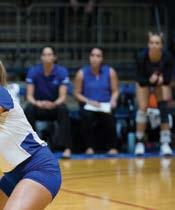
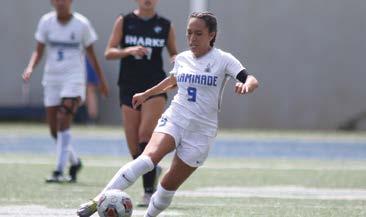
Garrick Gagurevich ‘23, Psychology
La'kea Gonsalves ‘25, Communications
Tatsushi Hirata ‘24, Business Administration
Brison Kim ‘24, Business Administration
Takahiro Kosins ‘22, Elementary Education Kekoa Kuloloia ‘24, Business Administration
Zach McClellan ‘25, Psychology

Riley Minigutti ‘23, Criminology and Criminal Justice Colin Roemer ‘22, Business Administration
Brandon Yasue ‘23, Criminology and Criminal Justice
WOMEN’S SOCCER
Breanna-Leigh Bactista, Master in Business Administraiton Caitlin Bocobo ‘24, Biology
Caili Cain ‘25, Biochemistry
Sharon Cain ‘23, Forensic Science
Alexis Chang-Takayama ‘23, Forensic Science
Randi Fontes ‘22, Nursing
Paige Garcia ‘23, Elementary Education
Asya Holt ‘23, Biology
Laina Jumawan ‘24, Biology
Tiare Kahalewai ‘22, Biology
Gracie Knowd ‘25, Data Science, Analytics and Visualization
Jenna McLean ‘23, Biology
Dayna Nishimura ‘23, Biology
Hoku Schatz ‘24, Business Administration
Clara Slate-Liu ‘25, Psychology
Shayla Padilla, Master of Art in Teaching
Morgan Smith ‘25, Biology
Tehani Smith ‘23, Community and Public Health
Naomi Takata ‘24, Nursing
Kyla Takazono ‘23, Elementary Education
Shantel Torres-Benito, Master in Business Administration
Nicole Vontsolos ‘22, Criminology and Criminal Justice
SOFTBALL
Kobe Brown ‘24, Psychology
Jaeda Cabunoc ‘23, Forensic Science
Charlize De Jesus ‘25, Behavioral Science
Taryn Fujioka ‘25, Business Administration
Robbi Gallegos ‘24, Communications
Kailah Gates-Coyaso ‘24, Business Administration
Taylor Genera ‘23, Biology
Haley Hayakawa ‘24, Forensic Science
Bailey Jacobsen ‘25, Elementary Education
Malia Ka'akimaka-Moisa ‘22, Forensic Science
Kieren Lopez ‘23, Environmental Science
Hailey Matsumura ‘22, Criminology and Criminal Jusice
Chasity McKean ‘23, Criminology and Criminal Jusice
Cheyne Obara ‘23, Elementary Education
Yolanda Racaza ‘23, Elementary Education
Keaolani Takemura ‘24, Psychology
WOMEN’S TENNIS
Sydney Danielson ‘25, Data Science, Analytics and Visualization
Skye Haraga ‘22, Biochemistry
Kayleen Lau 23, Biology
Marisa Luna ‘24, Nursing
Emily Ramirez Miranda ‘23, Environmental Science
Salamasina Robertson ‘22, Criminology and Criminal Justice
Kylie Ye ‘25, Environmental + Interior Design
VOLLEYBALL

Alecza Abary ‘24, Environmental Science
Marcelle Butler, Master of Business Administration
Alexia Byrnes, Master of Science in Counseling Psychology
Greta Corti ‘25, Psychology
Anna Dalla Vecchia, Master of Business Adminstration
Alyssa Grodell ‘25, Biochemistry
Allure Padilla ‘25, Criminology and Criminal Justice
Brooklen Pe'a ‘23, Communications
Annah Rivera ‘23, Biology
Elli Tsukano ‘25, Biology
Learn more about Chaminade’s Athletics program.
CHAMINADE TO ADD MEN’S BASEBALL AND WOMEN’S BEACH VOLLEYBALL TO ATHLETICS PROGRAM
Chaminade University announced it will add Men’s Baseball and Women’s Beach Volleyball to its Athletics offerings for the 2023–2024 academic year.
After an absence of more than 40 years, Chaminade Baseball will join the Pacific West Conference. In addition, Chaminade will become one of only two schools in the PacWest and one of three Division II institutions in the West Region to field teams in Beach Volleyball.
“We are incredibly excited to welcome these sports to Chaminade University starting in 2023, the first new additions in 17 years,” said President Lynn Babington, Ph.D. “Athletics are an important part of the spirit of our campus, and the addition of these new teams will help us to attract even more students interested in excelling in both athletics and academics.”
CHAMINADE MEN’S BASEBALL Chaminade University last fielded an intercollegiate baseball in 1980. In its inaugural season, the Silverswords finished 20-6 and earned a berth in the NAIA District II playoffs. However, due to budgetary restrictions, the program dropped to club level status in 1981 before disbanding altogether the following year. Chad Konishi was recently named head coach.
CHAMINADE WOMEN’S BEACH VOLLEYBALL
Chaminade has fielded beach volleyball as an exhibition sport since Spring 2013, playing various Division I schools over the years. Because the conference does not sponsor the sport and the NCAA does not separate beach volleyball into its traditional divisions (I, II, III), Chaminade will compete as an independent and be eligible for national championships at the same level as other high-profile programs. Current women’s volleyball indoor coach Kahala Kabalis Hoke will serve as the head coach of beach volleyball.
Added Chaminade University Director of Athletics Tom Buning, Ed.D., “This Chaminade University of Honolulu initiative reinforces the cocurricular value of our Silversword athletics to the campus experience. This decision aligns with the university’s mission to serve and educate the local community, which has an abundant source of talented interscholastic athletes who deserve the opportunity to compete at the collegiate level while earning a degree and staying close to home.”
Both baseball and beach volleyball will begin competition in the spring of 2024, raising the number of intercollegiate programs at Chaminade to 12.
CONTINUED
FROM PAGE 51
52 | CHAMINADE MAGAZINE
VIRTUAL FORUM WITH MEDICAL TEAM THAT PERFORMED THE FIRST PIG-HEART TRANSPLANT
Bennett, Sr., lived for two months with his donor heart before his condition deteriorated, and he was administered palliative care when it was clear he would not recover. David Bennett, Jr., said his father will be remembered for his humor, his kindness and his ardent belief in the power of education.
It was that legacy that helped make a rare opportunity a reality for the Silversword community.
On the afternoon in May, about 100 Chaminade faculty members and students, and individuals from the medical community, gathered for “Advances in Porcine Xenotransplantation,” a virtual forum with Bennett, Sr.’s, medical team and his son. The event was an opportunity for attendees to unpack the latest on the first-of-its-kind transplant, while also learning more about David Bennett, Sr., the “goofy” patient and beloved father and grandfather.
“It’s an honor and privilege to do this for my dad, who helped to advance science,” David Bennett, Jr., told participants. “He was always generous with his time, and he always reminded me how proud he was of me. My dad was somebody who had lots of friends and who got along with people very well.”
Dr. Bartley Griffith, the world-renowned cardiothoracic surgeon who performed the surgery at the University of Maryland Medical Center, said Bennett, Sr., was a “terrible candidate” for the operation “in the truest sense of the word.” His overall health was poor, and his ability to fight infections low.
“He would be classified as almost untreatable by transplantation standards,” Griffith said.
He was also deemed ineligible for a traditional heart transplant.
“The only thing about Dave that made him a great candidate was his toughness,” Griffith told participants, adding genetically modified pig hearts had only ever been transplanted into non-human primates. “We didn’t know if the pig heart would work for two minutes, two days, two months or two years. The testing of this was just done in animals, and they have a different immune system.”
Dr. Genevieve Griffiths, Dr. Claire Wright and Dr. Sandra Bourgette-Henry, of Chaminade, moderated the conversation, and presented questions gathered in advance from students and members of the faculty.
Wright, an associate professor of Biology, called the forum a great opportunity to learn
about the scientific and human aspects of a massive medical innovation. “This was a human who meant so much to his family and friends, and now leaves us with this wonderful legacy,” she said.
Griffith, the surgeon, agreed. “We are doing exactly what Dave Bennett, Jr., requested of us, which is to learn something and to spread that learning to those who are interested,” he said. Griffith added there is still much to discover about the transplant itself and about Bennett, Sr.’s, cause of death.
“We are still working with tissues to take a deep dive on what really happened,” Griffith said.
Dr. Kapil Saharia, an assistant professor of Medicine at UMMC’s Institute of Human Virology and Bennett’s infectious disease specialist, said the transplant underscores just how far transplant science has come in the last decade alone. “I think this is setting the stage for really bigger steps,” he said.

Dr. Alison Grazioli, UMMC medical director and the head of the Cardiac Surgery Intensive Care Unit, added Bennett, Sr.’s, transplant was “in many regards a success. We learned so much from Mr. Bennett and will continue to do so. It is everybody’s great hope that xenotransplantation will continue to improve.”
Grazioli spent long days—for months— caring for Bennett, Sr., and said she built strong relationships with him and his family along the way. “The greatest thing we got out of it was getting to know Dave Bennett, Jr., and his family,” she told attendees. “All of those unexpected things and all the hurdles that we had to overcome, it was made so much easier that we developed relationships with such great people.”
In response to a question about what’s next for animal organ transplants, Grazioli said more breakthroughs are around the corner. “There’s talk of clinical trials where we can, in a rigorous way … really get to define who should get these transplants and save the most lives,” she said.
“Mr. Bennett energized the science, and I think you’re going to hear a lot more about it.”
IN JANUARY 2022, 57-YEAR-OLD DAVID BENNETT, SR., WAS SUFFERING FROM TERMINAL HEART DISEASE WHEN HE MADE HISTORY—AND GRABBED HEADLINES—AS THE FIRST PERSON TO RECEIVE A GENETICALLY MODIFIED PIG’S HEART. THE GROUNDBREAKING OPERATION INSPIRED MILLIONS AND HERALDED A NEW FRONTIER IN TRANSPLANT SCIENCE.
FALL 2022 | 53
School of Nursing and Health Professions Launches Parish Health Program
ONE OF THE BIGGEST OBSTACLES TO HEALTH EDUCATION AND PREVENTION SCREENING IS ACCESS.
AND CHAMINADE UNIVERSITY’S NEW PARISH HEALTH PROGRAM IS FOCUSED ON ADDRESSING THAT.
The program, unique on O'ahu, gives Chaminade Nursing students the opportunity to work one-on-one with parishioners after Mass or via telehealth appointments to offer blood pressure, nutritional or other types of screenings, make assessments on determinants of health and connect them with resources.

The students receive critical hands-on experiences with members of the community. And parishioner participants who are 55 and older are equipped with tools they can use to improve their wellness.
“We really wanted to develop a Parish Health program to serve the needs of the community with education, health promotion and even healthcare,” said Dr. Pamela Smith, School of Nursing and Health Professions associate dean. “Many of our students enjoy
the fellowship and ministry part of school, and this was an opportunity to blend it into nursingrelated education and public health-related education.”
Smith said a Marianist Sponsorship Ministries Foundation grant helped cover costs for the program’s launch, including health promotion items for participants like pedometers, blood pressure monitors and gift cards to farmers' markets. The program was also made possible in part by Kaiser Permanente through the Catholic Care Coalition.
After conversations with community stakeholders, the program officially kicked off in the Fall Term in partnership with the Co-Cathedral of St. Theresa of the Child Jesus in Kalihi. Nursing students offered screenings and health education to parishioners at the co-cathedral after each Mass. They also connected with parishioners via
54 | CHAMINADE MAGAZINE
telehealth appointments—over the phone and through virtual meetings.
The program later included a focus on exercise—a virtual Walk to Jerusalem that focused on the importance of movement to overall health. Participants signed up for the walk online and then tracked their progress with others along the way.
The next step for the program, Smith said, is growth.
There’s hope it can be expanded to more parishes on O'ahu and even to the Neighbor Islands. The School of Nursing and Health Professions is also focused on increasing the number of students offering Parish Health services, including through one-on-one telehealth screening appointments.
Nursing student Zane Biscocho ‘22 was among those who participated in the program. As part of the telehealth rotation, he held 30- to 60-minute screening interviews with parishioners to discuss everything from healthy eating to the importance of taking prescribed medication on time.
“One thing that I enjoyed most about being a part of the Parish Health program was learning how to be adaptable, utilize telehealth and education fairs, and also getting the chance to educate my patients about their appointments and concerns they may have had,” said Biscocho, after completing the experience. “My biggest takeaway is that healthcare expands far beyond the hospital.”
He added that Parish Health is not only making a difference but adapting to meet participant needs.
That’s what Nursing student Tyler Insillo appreciated the most.
“It is always so important to meet people where they are,” she said. “We have to listen to what the community feels their needs are and address those needs accordingly, with consideration to not only their resources and time, but their readiness to learn and accept the education we are sharing.”
As part of the program, Insillo delivered telehealth surveys along with in-person lessons on cardiovascular health. She said working one-on-one with participants was a rewarding experience. “I enjoyed working with the community and helping them see the importance of a healthy lifestyle,” she said.
Learn more about the Parish Health Program.
2022 HAWAI'I CATHOLIC SCHOOLS TEACHER OF THE YEAR
THE COVID-19 PANDEMIC HAS BEEN TOUGH ON KIDS—AND RICA VELASCO KNOWS THAT BETTER THAN MOST.
As the guidance counselor at St. Joseph’s Parish School in Waipahu, Velasco has grappled with soaring demand for counseling services among students over the last two years. She’s sought to not only meet those needs but give kids new tools to appropriately express their feelings and manage them.
That’s why she worked with St. Joseph’s Principal Beverly Sandobal to roll out an innovative social-emotional learning program across all grade levels that’s already had a positive impact on young lives.
“When we opened after the COVID-19 lockdown…students and parents were afraid to return to school. Students were anxious and depressed, having difficulty with organizations and coping,” she said. “Since this program was implemented, students are more willing to talk about their feelings.”
Velasco’s dedication, her compassion and her service have been noticed.
And at the May 19 ceremony, Chaminade University and Hawai'i Catholic Schools named Velasco the Hawai'i Catholic Schools Teacher of the Year for 2022, presenting her with the Golden Pine“apple” Trophy along with $1,000 from Chaminade and John C. and Mary Lou Brogan, $1,000 in gas cards from Par Hawai'i’s Hele Gas and $1,500 for St. Joseph staff development from the Augustine Educational Foundation.

The honor left Velasco beaming—and humbled.
“I was shocked to receive this recognition since I work alongside many innovative and outstanding teachers at St. Joseph who inspire me every day,” she said. “I am passionate about my work and grateful for this acknowledgment. Our team allows us to move mountains. I’m blessed to be part of this school.”
In addition to serving as the guidance counselor at her school, Velasco is the technology director and even steps in as a substitute teacher when needed. Her technology director hat has kept her particularly busy during the pandemic, with launching online and hybrid learning platforms and troubleshooting.
She also oversees her school’s one-on-one distribution of digital devices to students.
FALL 2022 | 55
“Online learning was a challenge and an opportunity for our teachers to leap into digital learning,” Velasco said. “Today, I’m proud that all our teachers use technology to engage and enhance learning. Technology is constantly changing, and it challenges me to be open to change in all that I do.”
But it is her role as guidance counselor, watching students develop into “empathetic, confident and collaborative individuals,” that Velasco most enjoys. “Meeting with students who have difficulty making friends and then seeing them on the playground laughing with others is a joy for me,” she said.
Colleagues who nominated Velasco for the award said her implementation of the social-emotional learning program has made a significant difference at the school, especially as students and teachers alike navigate the “new normal” of the pandemic. “It helped both teachers and students cope with the uncertainties of living with COVID-19,” one colleague wrote. Another said that Velasco has created an environment that fosters empathy, understanding, and strong and healthy relationships.
Sandobal, the school principal, said she couldn’t agree more. She related the case of one kindergartner who had difficulty speaking to peers and teachers alike. Velasco, she said, helped create safe places so the student could begin to confidently express herself.

“The student is now in third grade and is not afraid to articulate her thoughts and ideas inside and outside the classroom,” Sandobal said. “We and her parents are so proud to celebrate her progress.”

Sandobal added that as school counselor, Velasco has also helped address bullying by working with teachers and students, conducting classroom observations and creating a daily report card to accomplish specific goals. She has also provided teacher training on behavior plans.
“Living out the school’s mission is the central point and focus of all the work that Rica does as counselor,” Sandobal said. “With her focus on relationship building, she has provided significant ways for us to provide a safe, caring, family-oriented environment that is centered in Jesus Christ.”
Velasco said she looks forward to continuing the growth of her social-emotional learning program, including by facilitating new conversations with parents and community members. “Our school faced many challenges over the past couple years,” she said. “We grew and changed together and walked away more competent, resilient and faith-filled. I look forward to what God has in store for us.”
CONTINUED
FROM PAGE 55
56 | CHAMINADE MAGAZINE
CHAMINADE UNIVERSITY LAUNCHES
Ed.D. in Educational Psychology Program
“This program is all about helping students with the highest needs,” he said.
UNIVERSITY
The Ed.D. program, which is offered fully online, is designed for mental health professionals serving in educational settings and driven to build their skills as leaders, mental health counselors and scholar-practitioners. Dr. Darren Iwamoto, program coordinator, said the degree’s cutting-edge curriculum includes a wealth of hands-on experiences, including around psychological test administration.
He added the doctoral program was developed to help Hawai'i meet a critical and growing need for advanced clinical professionals in educational settings. And while the Fall 2022 cohort will be restricted to Department of Education employees, Chaminade plans to open seats to the public within two years.
“We worked incredibly closely with the DOE and other key stakeholders in designing this program so it was a pure partnership from the very beginning,” Iwamoto said. “It’s about meeting a need that’s currently a gap in the Department of Education system and the community more broadly.”
Iwamoto said the program was specifically tailored to meet the rigorous Hawai'i Department of Commerce and Consumer Affairs academic requirements for mental health licensure. Participants also complete 600 internship hours and write a dissertation that’s woven into coursework.
After finishing the 60-credit hour program, students will be fully qualified to serve as educational psychologists in Hawai'i PK-12 schools or in related sectors, such as with nonprofits that deliver services to youth. Iwamoto added the doctoral degree puts a strong emphasis on cultural awareness and considers the whole student as part of a push to broaden key support systems.
Chaminade President Lynn Babington, Ph.D., said the program underscores the university’s tireless commitment to meeting community needs head-on—with quality, innovative and relevant programming designed to prepare students to serve others and drive positive change.
“The COVID pandemic and its fallout have not only highlighted the shortage of mental health professionals in Hawai'i but worsened it,” Babington said. “We know the new Doctor of Education in Educational Psychology is part of the solution and look forward to seeing graduates of this program taking on the challenges they see around them and helping build healthier, happier communities.”
Coursework in the program helps students to build a strong foundation for their direct service and leadership opportunities. It includes explorations of legal, professional and ethical issues, techniques for advanced counseling and group facilitation, and special education identification and assessment.
“This program—years in the making—was made possible thanks to the invaluable support, insight and expertise of our valued collaborators at the Hawai'i Department of Education,” said Dr. Dale Fryxell, dean of the School of Education and Behavioral Sciences. “We are proud to be partnering with them on a multi-year effort to strengthen the psychological support framework in Hawai'i’s public schools.”
As an added benefit, Iwamoto said the Department of Education was able to secure federal grant funding to cover tuition, fees and other expenses for members of the inaugural cohort. Chaminade hopes to have 20 members in the first class, and they will begin their coursework in October.
Learn more about our Doctor of Education in Educational Psychology program.
 AS PART OF AN EXCITING PARTNERSHIP WITH THE HAWAI'I STATE DEPARTMENT OF EDUCATION (DOE), CHAMINADE
IS GEARING UP TO WELCOME ITS INAUGURAL COHORT FOR THE NEW DOCTOR OF EDUCATION IN EDUCATIONAL PSYCHOLOGY PROGRAM.
AS PART OF AN EXCITING PARTNERSHIP WITH THE HAWAI'I STATE DEPARTMENT OF EDUCATION (DOE), CHAMINADE
IS GEARING UP TO WELCOME ITS INAUGURAL COHORT FOR THE NEW DOCTOR OF EDUCATION IN EDUCATIONAL PSYCHOLOGY PROGRAM.
FALL 2022 | 57
NOTABLES
Lynn Babington, Ph.D. | PRESIDENT
Dr. Babington was a featured panelist on Pacific Business News’ Healthcare Roundtable where they explored the causes of a shortage of healthcare professionals in Hawai'i, especially nurses, which has only been exacerbated by the pandemic.
Tom
Buning, Ed.D. | DIRECTOR, ATHLETICS
Dr. Buning was featured on KITV4 and KHON2 newscasts talking about the addition of baseball and women’s beach volleyball to Chaminade University's athletics program starting in the 2023–2024 academic year.
Gail Grabowsky, Ph.D. | DIRECTOR, UNITED NATIONS CIFAL HONOLULU CENTRE; DEAN, SCHOOL OF NATURAL SCIENCES AND MATHEMATICS
Dr. Grabowsky and Chaminade student Rhea Jose were featured on ThinkTech Hawaii where they discussed Chaminade’s United Nations-affiliated CIFAL Honolulu Centre, climate change and loss of habitat.
Kolby Kanetake | ASSISTANT COACH, WOMEN’S VOLLEYBALL American Volleyball Coaches Association has named Kolby Kanetake to its 2022 class of “Thirty under 30” coaches. This honor is reserved just for coaches in the collegiate, high school and club ranks.
David
Carter, Ph.D. | DIRECTOR, FORENSIC SCIENCES PROFESSOR, FORENSIC SCIENCES
The American Academy of Forensic Sciences (AAFS) recognized Dr. David Carter for his significant contributions to the discipline, to the broader community and to his students with the AAFS Pathology/Biology Section Award for Achievement in the Forensic Life Sciences. The prestigious honor from the organization is reserved for those who have demonstrated exemplary excellence in the practice, advancement and teaching of forensic applications in the life sciences.
Makana
Craig | DIRECTOR, CHAMINADE ONLINE
Makana Craig was featured in U.S. News & World Report’s article that provided online college students with time-management tips.
Jennifer Creech | VICE PRESIDENT, ENROLLMENT MANAGEMENT AND STUDENT SUCCESS
Jennifer Creech was named Vice President for Enrollment Management and Student Success, where she will oversee the Admissions, Financial Aid and Student Success teams. Creech brings more than 15 years of experience to the position. Prior to her new position, Creech served as Chaminade University’s Assistant Vice President for Student Success and Registrar since 2020.
Christine Denton | VICE PRESIDENT, HUMAN RESOURCES AND LEGAL AFFAIRS
Christine Denton was interviewed by the Honolulu Star-Advertiser to discuss the possibility of the Supreme Court overturning the racial affirmative action case, and how it would affect Chaminade Univeristy’s admissions process.
Guanlin Gao, Ph.D. | DIRECTOR, ECONOMIC EDUCATION CENTER FOR EXCELLENCE; ASSOCIATE PROFESSOR, SCHOOL OF BUSINESS AND COMMUNICATION
Dr. Gao was featured in Pacific Business News discussing Chaminade’s new Economic Education Center for Excellence, a training and resource center for K-12 teachers in Hawai'i. She also talked about the importance of financial literacy and the need for more educational tools.
Dana Monday, DNP, APRN-Rx, PMHNP-BC
ASSISTANT PROFESSOR, SCHOOL OF NURSING AND HEALTH PROFESSIONS
Dr. Dana Monday was featured on KITV4’s news segment about Hawai'i’s mental health crisis as demand surges while there is a shortage of mental health providers. She discussed the most common mental health problems and the dangers associated with them.
Roy Panzarella, Ph.D. | DIRECTOR, HOGAN ENTREPRENEURIAL LEADERSHIP PROGRAM
Dr. Panzarella talked about the Hogan Entrepreneurial Leadership Program on Hawai'i Public Radio’s Bytemakers Cafe . He shared how the program is preparing the next generation of Hawai'i entrepreneurs.
Pamela Smith, Ed.D., APRN-Rx, FNP-BC ASSOCIATE DEAN, SCHOOL OF NURSING AND HEALTH PROFESSIONS
Dr. Smith and Nursing student Ikona Kahana-Sanchez ‘23 were featured on Hawaii News Now discussing the shortage of nurses in Hawai'i and preparing students for the ever-changing healthcare sector. Smith was also featured on KHON2 to discuss the increased interest in the nursing sector.
Claire Wright, Ph.D. | SENIOR DIRECTOR, OFFICE OF SPONSORED PROGRAMS; ASSOCIATE PROFESSOR, SCHOOL OF NATURAL SCIENCES AND MATHEMATICS
Dr. Claire Wright was featured in Hawai'i Bulletin’s “Artificial intelligence and machine learning are transforming medical care” article in which she discussed Chaminade University's collaboration with AIM-AHEAD for its first Inclusive Innovation Virtual Symposium that's dedicated to starting the dialogue on artificial intelligence/machine learning with Pacific Islander communities.
58 | CHAMINADE MAGAZINE

chaminade.edu THIS PAPER STOCK HAS BEEN INDEPENDENTLY CERTIFIED TO FSC® STANDARDS. ALSO THE INKS SELECTED FOR THIS ISSUE ARE RENEWABLE VEGETABLE-BASED INKS. Chaminade Magazine is produced by: Chaminade University of Honolulu University Communications and Marketing 3140 Wai'alae Avenue, Honolulu, HI 96816 Chaminade Magazine is published by Chaminade University of Honolulu. © 2022 All rights reserved. Website: chaminade.edu/publications Email: ucm@chaminade.edu Send class notes to: alumni@chaminade.edu Record changes to: records@chaminade.edu chaminade_univ ChaminadeUniversity ChaminadeUniversity ChaminadeUniversity FPO (replace)

NONPROFIT ORG. U.S. POSTAGE PAID HONOLULU, HI PERMIT NO. 320
CHANGE SERVICE REQUESTED
3140 Wai'alae Avenue Honolulu, Hawai'i 96816-1578










 CHAMINADE UNIVERSITY IS PROUD OF ANOTHER STRONG SHOWING IN THE U.S. NEWS & WORLD REPORT’S BEST COLLEGES RANKINGS, WHICH ONCE AGAIN NAMED CHAMINADE AMONG THE TOP REGIONAL UNIVERSITIES IN THE WEST.
CHAMINADE UNIVERSITY IS PROUD OF ANOTHER STRONG SHOWING IN THE U.S. NEWS & WORLD REPORT’S BEST COLLEGES RANKINGS, WHICH ONCE AGAIN NAMED CHAMINADE AMONG THE TOP REGIONAL UNIVERSITIES IN THE WEST.



































 NONPROFIT BUSINESS PLAN COMPETITION ARE AS DIVERSE AS THE CLIENTS
NONPROFIT BUSINESS PLAN COMPETITION ARE AS DIVERSE AS THE CLIENTS



























 TO HELP MEET A CRITICAL NEED FOR MENTAL HEALTH SERVICES, LEADERSHIP AND PROGRAM ADMINISTRATION IN HAWAI'I, CHAMINADE UNIVERSITY LAUNCHED A NEW DOCTOR OF MARRIAGE AND FAMILY THERAPY (DMFT) PROGRAM—THE INAUGURAL COHORT OF STUDENTS BEGAN THEIR ACADEMIC JOURNEY IN OCTOBER.
TO HELP MEET A CRITICAL NEED FOR MENTAL HEALTH SERVICES, LEADERSHIP AND PROGRAM ADMINISTRATION IN HAWAI'I, CHAMINADE UNIVERSITY LAUNCHED A NEW DOCTOR OF MARRIAGE AND FAMILY THERAPY (DMFT) PROGRAM—THE INAUGURAL COHORT OF STUDENTS BEGAN THEIR ACADEMIC JOURNEY IN OCTOBER.
























 AS PART OF AN EXCITING PARTNERSHIP WITH THE HAWAI'I STATE DEPARTMENT OF EDUCATION (DOE), CHAMINADE
IS GEARING UP TO WELCOME ITS INAUGURAL COHORT FOR THE NEW DOCTOR OF EDUCATION IN EDUCATIONAL PSYCHOLOGY PROGRAM.
AS PART OF AN EXCITING PARTNERSHIP WITH THE HAWAI'I STATE DEPARTMENT OF EDUCATION (DOE), CHAMINADE
IS GEARING UP TO WELCOME ITS INAUGURAL COHORT FOR THE NEW DOCTOR OF EDUCATION IN EDUCATIONAL PSYCHOLOGY PROGRAM.






























